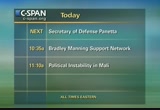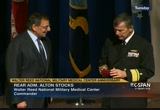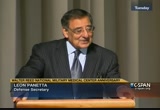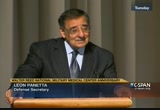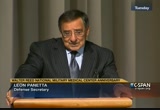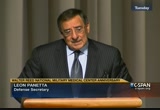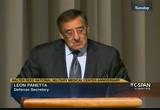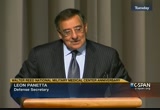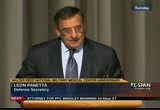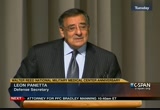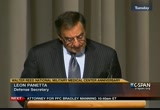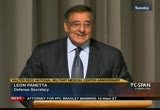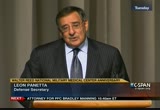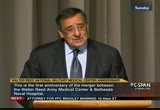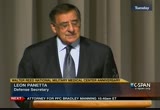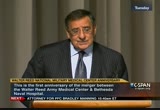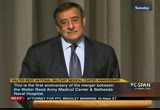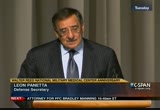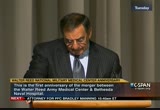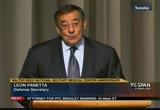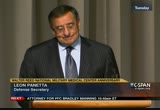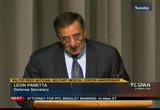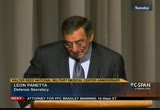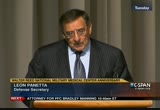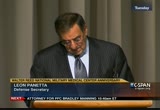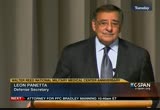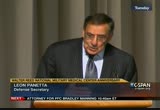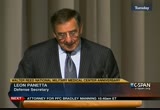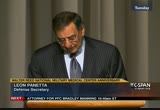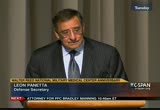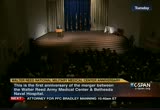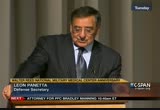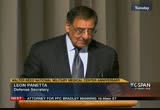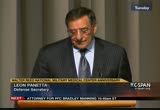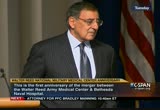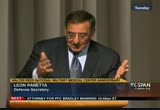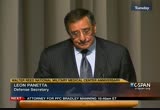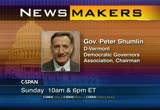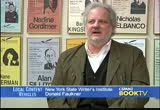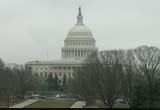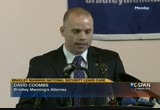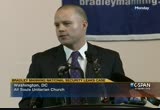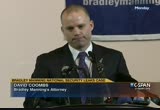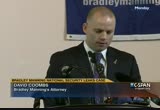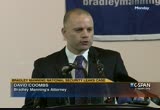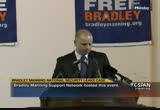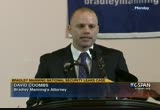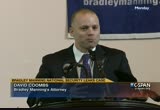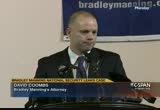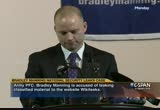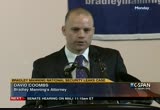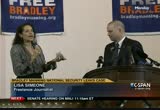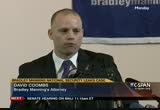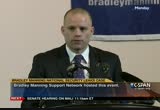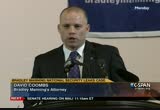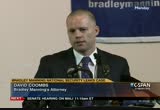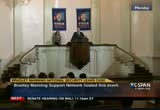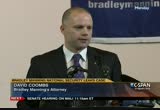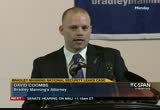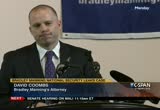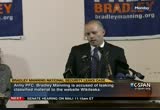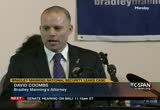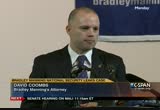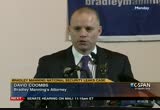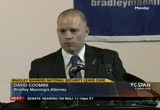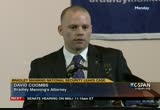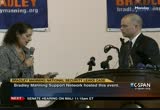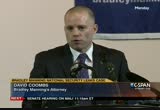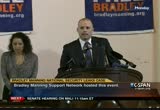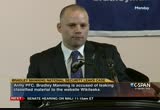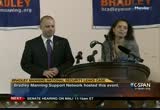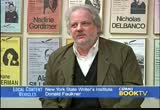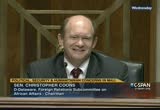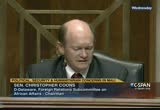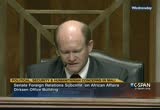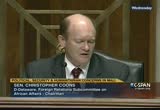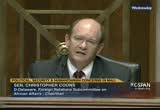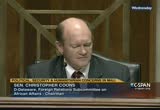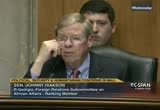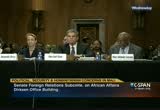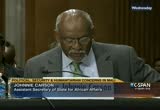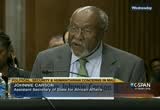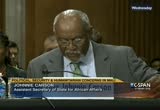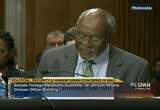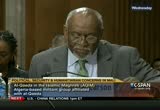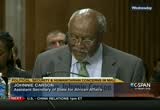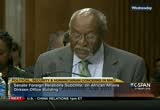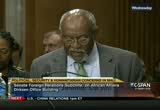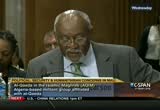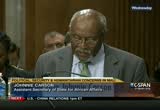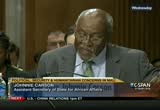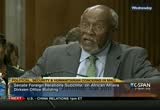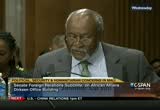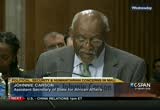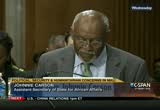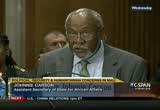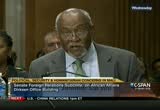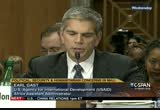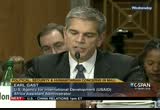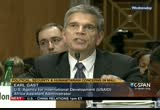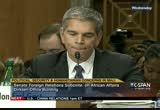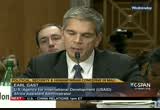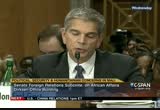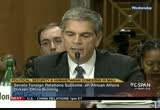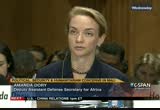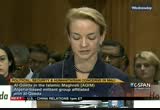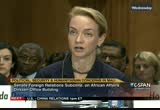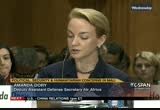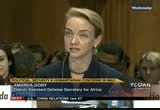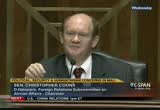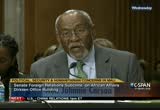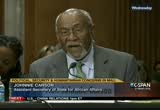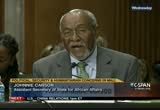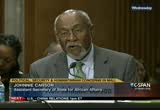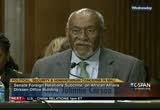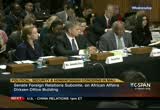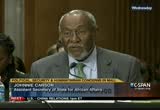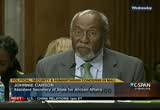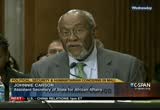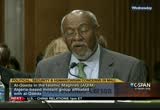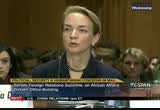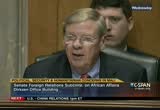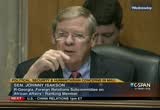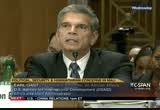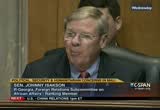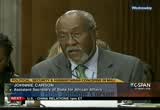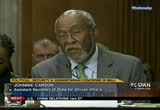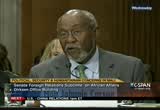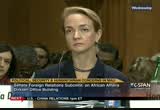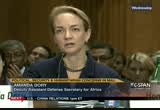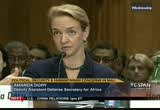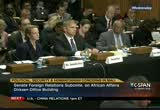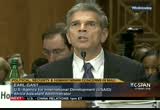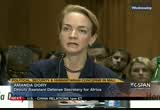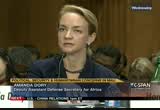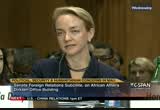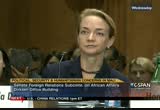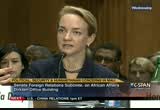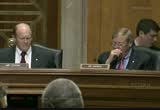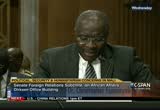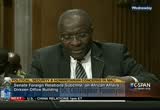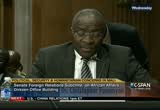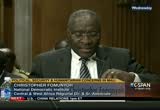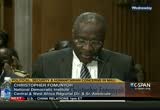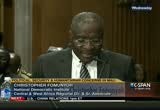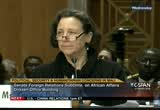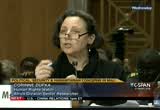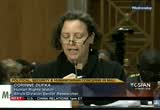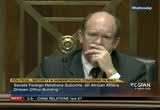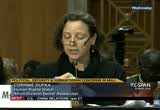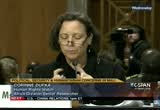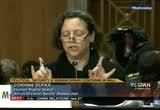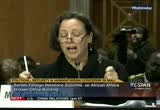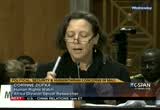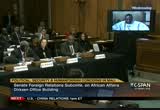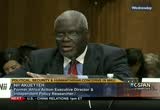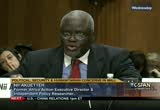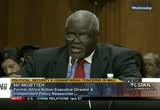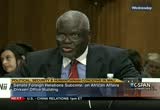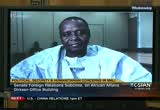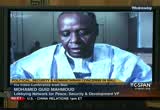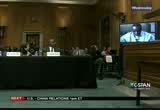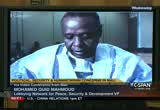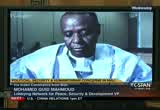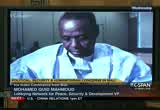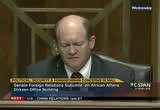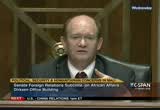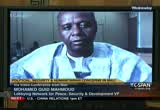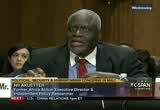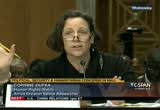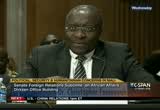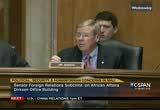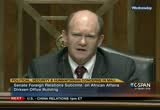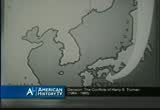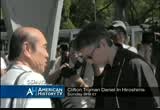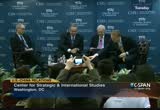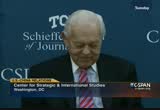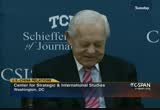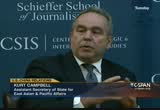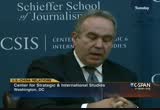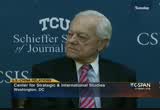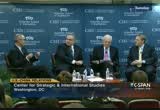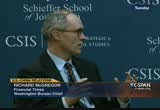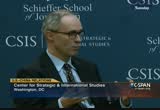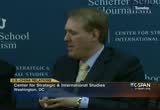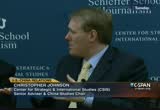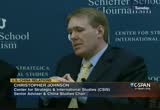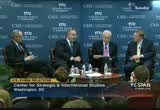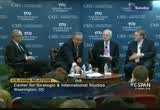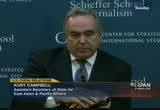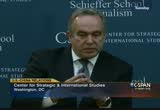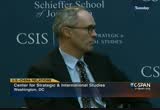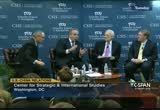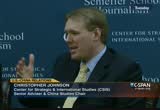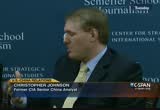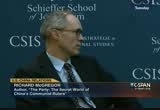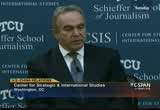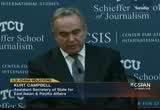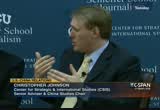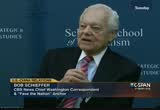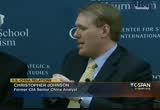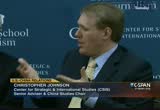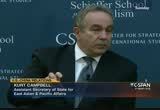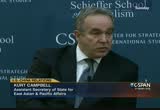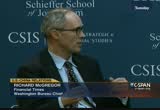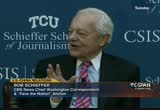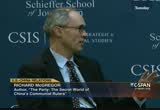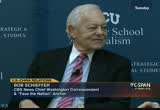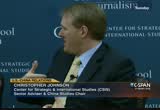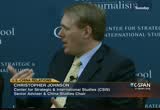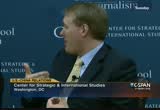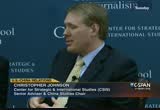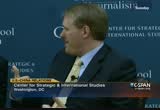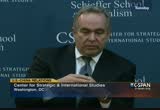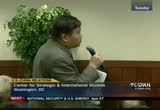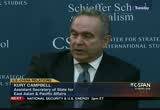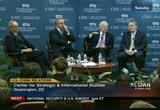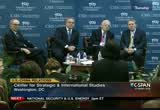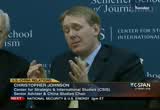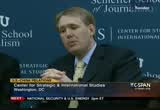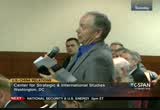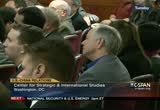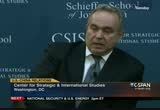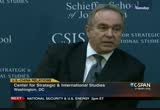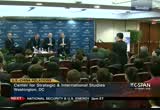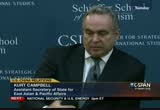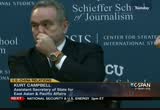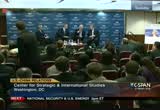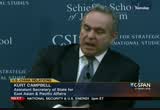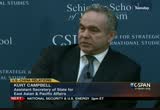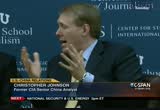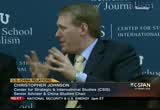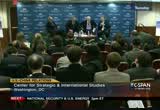tv Washington This Week CSPAN December 8, 2012 10:00am-2:00pm EST
10:00 am
10:01 am
secretary of defense leon panetta visits the walter reed medical center followed by david coombs, bradley manning's of turning. the hearing on the republic of mali. >> the supreme court will look at what was passed in 2008 by a majority of 6-3. they're going to say that this president. >> they decided it was constitutional for them to establish i.d.s they did not say all of those states. >> correct. let me finish. you are misrepresenting what i am saying. >> when i hear these accusations that black people, voter i.d.
10:02 am
laws a disproportionately affect us. if white people can go through all the laws, what are you telling back people? they are less than? that is what bothers me about rhetoric. we always have to make special --there has to be a specialist when we deal with minorities. it there too feeble mind it appeared we need to make concessions. they cannot follow the rules. we treat people like victims, i do not think they want to aspire. >> defense secretary leon
10:03 am
panetta visited the walter reed medical center tuesday to celebrate the hospital's first anniversary. it was created out of the merger of the walter reed army medical center and the bethesda naval hospital. this is about 40 minutes. >> it is my true pleasure to welcome me here this morning. over a year ago to host a dedication ceremony for what was then the new walter reed medical center. you are words that many of us that day. he pointed out if his the people that can make the biggest difference. -- he pointed out that it is the people that can make the biggest difference. i would be happy to report to you that we stand before you as
10:04 am
one team. this is the tradition for a new commander to mint a coin. are like to able to present one to you. -- i would like to be able to present one to you. there you are. thank you, sir. >> thank you very much. >> thanks for being here. [applause] thank you very much, admiral. i appreciate that very much and i really appreciate the opportunity to be able to be here at this one-year anniversary of bringing bethesda-walter reed together. this was an amazing effort, not easy to do, but i commend all
10:05 am
of you for your willingness to work together as a team and to make this a success. i want to thank you for your leadership, because what you have here is a world-class center for healing, for compassion, and for empowerment. i am particularly honored today because, you know, in a holiday season, first and foremost i would like to wish all of you and your families and the entire walter reed community a safe and happy and healthy holiday season. this is a season of renewal.
10:06 am
it's a season of joy, of peace, and of looking to the future and being thankful for the past. and all of that is encompassed in these great medical centers because that's what it's all about, is giving people that second chance at life and that's what you do. this is a time of year to reflect on all the blessings that have been bestowed on all of us as citizens of this great country, and in particular the blessings that we have to be members of the department of defense family.
10:07 am
someone asked me the other day, kind of, you know, reflecting on the job of secretary of defense what's the toughest part of this job and what's the most memorable part of this job? and for me, it comes down to the men and women who serve this country in uniform. the toughest part of this job is to have to take the time to write notes to the families of those who have lost loved ones in war. and it's tough because as the father of three sons, recognizing the pain that that family must feel at the loss of a loved one is something that leaves a deep impact on me. and the ability to kind of take the time to write a few words
10:08 am
of comfort, and there are no words that you can find that can do justice to the pain that's involved here. but for each one, i try to write a note that not only expresses, obviously, my sorrow, but also says that their loved one loved them, loved their family, loved this country, and gave their life for all they loved. and that makes them an american hero forever. those are the toughest moments
10:09 am
in this job. the most memorable moments are to come here and visit wounded warriors because the opportunity to be able to look into their eyes, individuals that have suffered the most horrendous injuries you can imagine, as all of you know, but then to walk into these rooms and to look into their eyes and see a spirit of wanting to fight on, and wanting to get back into the battle, and wanting to be whole again. and knowing that if they fight hard enough, they'll make that work.
10:10 am
i mean, to see that spirit -- to see that undying spirit of renewal is for me the most memorable thing because it represents, in my book, the spirit of this country. each time i visit these heroes here, i come away very moved and very inspired by their dedication, by their patriotism, and as i said, by that sheer strength of spirit that they have we as a nation owe them an incredible debt of gratitude for their service and for their sacrifice -- men and women who are willing to put their lives on the line for this country, who are willing to fight and die for the united states of
10:11 am
america. that represents the great strength of our country. i often say, we've got, you know, we have the very best in weapons. we've got great ships. we've got great planes. we're developing future aircraft that are going to be incredible, future fighter planes that are going to be incredible. you know, we've got great technology that's available. but none of that is worth a damn without the men and women
10:12 am
in uniform who are willing to put their lives on the line and help to protect this country. that is the real strength. ^that is the heart and soul of what makes us the strongest country in the world. we owe them as a result of that the finest medical care that this nation can provide. and that's why i'm so grateful that we have the greatest medical healthcare system in the world, right here. and the strength of our system lies in you, and people like you. thousands of dedicated professionals who are committed to caring for our sick and for
10:13 am
our injured. it lies with each of you. this, as i have said before, is a place where miracles happen, and you are the miracle workers. today, i want to thank you, along with the entire military medical community, for the exceptional care, the exceptional support you provide our service members, for these men and women in uniform, for their families, and for our military retirees. you give them a second chance at life. this community is particularly close to my heart. my wife was trained as a nurse, and one of our three sons is a cardiologist. for those of you that haven't had a wife as a nurse, you don't
10:14 am
know what the hell it's all about. because there isn't a damn thing i can do without her being right there, and watching everything you do, and watching everything that our sons did, you know? it was incredible. their experience and i learned this from sylvia, and i learned it -- and i see it now in -- in our son, who's a cardiologist. it is very important to understand that no matter how many people you have to deal with, you don't treat people by the numbers. every one of them has to be special, and it's gotta show in your eyes. the best caretakers are the
10:15 am
ones who have the compassion to work with people, and to treat them with dignity, and care, and understanding. that's not always easy, because you're dealing with a lot of people, and it can be really tough, but the reality is that, that sense of compassion, of making every patient feel special is what it's all about. i know how tough this job is. i know how difficult it can be, and how hard it is for each of your, and the amount of work it takes, and the amount of sacrifice that it takes to do your job. so, i thank you from the bottom
10:16 am
of my heart for the commitment that all of you make to this -- it's challenging work, but i can't tell you how important it is to -- not only healing those that have been wounded, but healing our country when we fight in wars makes the hell of a difference in terms of our ability to sense that as tough as these battles are, as tough as these wounds are, that somehow we are strong enough to be able to go on. and that's what you do. this country, and our armed forces, are emerging from over a decade of war. this is the longest sustained period of war in the history of the united states. there's been a non-stop flow of casualties from distant
10:17 am
battlefields. and our military medical community has, i believe, risen to the challenge time and time and time again. you have provided thorough and effective care for over 50,000 wounded warriors, 50,000 wounded warriors. and you've helped ensure that millions of our men and women in uniform are healthy and able to perform their vital missions. thanks to the advances in medical technology and the innovations in medical training -- the incredible amount of innovations and development over these last few years 98 percent of the wounded who reach our combat support hospitals survive their injuries, the highest rate of survival this country has ever achieved. you made this happen by standing side by side as one
10:18 am
team, as one joint facility, army, navy, air force. you have become one of the best medical teams in the world. and by raising expectations, by making clear that there is always hope, that good things can happen by advancing training, by increasing responsibility, our corpsmen, our medics are now capable of delivering life-saving medical care right there on the battlefield. this is the new standard of medical care, and i'm very proud to say that it is the most advanced in the world.
10:19 am
a real revolution has taken place in battlefield medicine. it has truly been a revolution and in our ability to care for the most serious combat injuries. we have also seen that a higher survival rate can result in a new set of complex injuries when our soldiers return home. and you're responding to that challenge as well. here at the center of healing, the center of miracles, you have treated diseases that we've never seen before on our soil. you perform life-saving surgeries that are the first of their kind. and you've developed the most advanced prosthetics in the world. it's thanks to your extraordinary talent and
10:20 am
dedication that we are able to provide the level of care that we owe to our wounded warriors. and i see it when i go into those rooms and talk with them that they know. they've seen the fact that others get their life back as a result of what's been developed here. and that, too, renews their spirit that ultimately they're going to make it and they're going to be okay. in the decade to come, we're going to be challenged in new ways, and we've got to be ready to meet those challenges as well. thousands of service members are going to be coming home soon
10:21 am
over the next several years, the end of the war in iraq, beginning to draw down in the war in afghanistan. we have got to be ready for their arrival by supporting their physical health, their emotional well-being, and their successful transition back into society. some of our returning service members will bear both the visible and the invisible wounds of war. since 2001, nearly 250,000 men and women of the armed services have suffered traumatic brain injury and many more remain undiagnosed. to care for them, this department instituted new guidance in september. we built concussion restoration centers in theater. we've developed traumatic brain injury centers at many of our military bases around the world. thanks to the efforts of our military medical professionals, we now have specific guidelines
10:22 am
and treatments for what is one of the most elusive injuries that we've ever seen. we've also developed way to better identify traumatic brain injury and we're training our medics and our corpsmen to respond more effectively when a service member experiences a potential concussion. we have also discovered the value of rehabilitation, and how. the national intrepid center of excellence right here on campus, built by the generous donation of the fisher family, is a world model, a world model for recuperating the human being, and not just treating the disease. let me also note, if i might,
10:23 am
that yesterday you dedicated another world-class facility here, cancer treatment center, in honor of jack murtha. jack was a dear friend of mine, had the honor of serving with him, passed away a couple years ago. we served in congress. we worked together on a range of issues. he was a legendary advocate for our men and women in uniform, and he was strong supporter, strong as i've ever seen in the congress of the military's medical community in particular. jack loved earmarks. everybody, including myself, used to line up and talk to
10:24 am
jack about earmarks, and if you -- somebody -- i haven't seen it, but in the lincoln movie, talks about lincoln sending people up to the hill to basically hand out earmarks in order to get their damned vote. that's one of the reasons they may be having a tough time on capitol hill, is because they don't have earmarks to hand out. but, jack knew how to do it, and i've never seen anything like it. when the defense authorization bill used to come up, and he use to be -- i mean, at the appropriations -- i mean, all these appropriations bills used to go on, they used to be amendments, they used to take days. i used to chair some of the discussions on the floor of the house on these other bills. but, when the defense
10:25 am
appropriations bill came up, jack had basically distributed enough earmarks that, that bill took about 30 seconds on the floor. so he understood what it meant, but more importantly, he did it in a way that benefited, in particular, the men and women in uniform. he was totally dedicated. having been a veteran himself, having understood what it meant to go into battle, he really understood what men and women in uniform needed. and so, i am truly delighted that the john p. murtha cancer center will stand as a monument to his legacy and to his commitment to our armed
10:26 am
forces. these centers provide extraordinary physical care for our military family. but here at walter reed you also understand the importance of caring for emotional health as well. together, military medical personnel, and military families are raising awareness about those hidden wounds of war, that i talked about, particularly mental health. yet, as we know all too well, the historic rate of suicide within the military continues to haunt us. suicide is one of those great and terrible challenges to the health of our force, and one of the greatest challenges we face as a nation, not just a problem that's affecting men and women in uniform, it's affecting society, and it's reflected obviously in our men and women in uniform. our greatest challenge is identifying those who need our help. how do we identify those that are facing this kind of
10:27 am
terrible crisis? i know that all of you have not, and will not rest until there is a lifeline for every one of our nation's service members. we must make sure that they know they're not alone, that we're here and that we will stand by them. this year alone, the departments of defense and veterans affairs have committed an additional $150 million to support efforts targeting mental health awareness, diagnosis and treatment. we're working to increase the number of mental health professionals, improve access to suicide hotlines, emphasize family counseling. we've got to continue this fight on every front. we've got to make people in the
10:28 am
chain of command, people that serve next to each other in a squad, have a sense for looking out for one another, of spotting those conditions, of understanding that there may be trouble. now, this -- in many ways, it's a changing society. this is my theory and my theory alone, but, you know, part of the problem of working off blackberrys and working off computers is that you're focused on that element and you don't reach out as much to talk to one another, and to just communicate with one another. and it's when you do that, when you talk to one another, that you understand what the problems are. you can look into their eyes and you can see it. you've got to make sure that people understand that there's a responsibility here to care
10:29 am
for one another. we know that it's important to watch people's backs when you're in a foxhole. that applies here. you've got to watch each other's backs with regards to the kind of problems that can impact on people's mental health. and that's something we've got to build into the force as well, and we will. as our troops return home, we will also help them convert their hard-earned experience into roles that are needed by both the military and civilian communities. that means new training programs, pathways, opportunities for our medics and corpsmen to become physician assistants or nurses, supporting advanced degrees, streamlining credential
10:30 am
requirements. because if someone can save a life in afghanistan, then they can save a life here at home as well. we've got to make that possible. we are working with other cabinet departments and with the white house to standardize the way state licensing boards recognize military training and experience. and we're also working with human resources and services administration to recruit members in the medical profession who are interested in pursuing similar careers in the private sector. having a job ready for our returning service members is an important piece of the larger effort to support our service members, our veterans, and our military families as we come out of this decade of war.
10:31 am
and all of you have a critical role to play in that effort as well. as you support our troops in their greatest time of need, i want you to know that i will continue to fight, continue to try to safeguard this department's support for your mission. you are, as i said, miracle workers, the absolute best at what you do. and we owe it to you to make sure that you have the full support you need in order to do your job. your skill, you dedication -- that tender compassionate care that you provide those who serve in uniform, those qualities are second to none. we are extremely proud and extremely fortunate to welcome our troops and their families back from war into your caring arms, into your caring arms.
10:32 am
they have fought for us. we have to do everything we can to fight for them. god bless all of you. god bless our military. and god bless this great nation of ours. thank you very much for having me. [applause] at i understand we are opening the floor for some questions. if you have any questions, please have at it.
10:33 am
>> good morning. it has been an but over a year since to appear in great is our medical centers came together. have we met your expectations for this year at? what are your exhortations for the next few years? >> having been through this and having been involved in government service for over 40 years, i count my time in the army intelligence. it is close to 50 penc. having worked in various areas in congress and the executive branch, doing what we do here is not easy.
10:34 am
so often part of what you do with, the challenges thank you have to work together. you have to be able to work together. sometimes it is not that easy. when it came to the joint effort here, in the military itself, i feel we have developed joint news as a real strength of our military. they're not even close to the level of joyousness we have in this country. it is working. it is doing well. my biggest challenge is going to be how can we take this model to
10:35 am
make sure we can develop similar approaches elsewhere between military and veterans' hospitals paying able to come together, at being able to operate as one incident having these huge backlogs because they're trying to move someone from the military into the veterans operation and it becomes a huge pain in the ass to get it done. if we can bring that together so we are operating as one with the ability to really respond to the needs and not get wrapped up in fighting for turf, i think we can do a better job overall. i am extremely pleased. there are always some problems you have to deal with. that is the nature of having to
10:36 am
do this. you have done the very best job at making this work. and making it work and not for ourselves but making it work for the people we treat. those that are wounded, giving them a chance to be able to heal. that is the ultimate test. if i use that as a test every time i talk to these kids, every time i see them, that is the measure of your success. that is the measure of your success. i thank you for that. >> good morning. your predecessors said we have no higher priority aside from the war itself than to take care of the young men and women who have been injured in combat. how do you see us making this a
10:37 am
reality within the health system? >> that is something that has been identified as something that is really important to this effort to make it work more seamlessly. information is key. the ability to bring that information together is extremely important to our medical professionals. i could tell you this is great and we're going to do this. this is a of a challenge. it is not easy. part of it is the entrenched bureaucracy that is there. sometimes it is difficult to get out of the trenches and do what they have to do.
10:38 am
part of it is the technology. we think because of all operate on computers that somehow you can make this all happen overnight. it is not -- it does not work that way. it takes a lot of advanced technology. we are working to try to get that done. we have invested money into this effort. we're not going to give up. we're going to continue to work. our ability to reach that point will help us. that is the future. it is going to happen. it is tougher than hell to try to get it done because of the problems you run into with technology, with individuals to sometimes do not want to move.
10:39 am
this is what i'm doing. [applause] >> with your position i am going to ask if we can please hold the further questions. you honor us with your presents and urge you with your presence -- you honor us with your presence in the entire nation with your leadership. >> we're going to pass out claims. they aren't worth a of a lot they might get a drink. >> the new chairman of the
10:40 am
democratic governors association. he talks about the fiscal cliff, affordable care act in laying the groundwork for the 2013-2014 elections. >> why a writers institute? >> i think it is something that is very important. we are a culture of words, of voices. words are a key to our imagination, our capacity to imagine things. we are not completely tied to print on the page. there is no other art form so
10:41 am
readily accessible other than perhaps soma, which we work with, too. there is something in literature that captures the human. . the >> joint american history television and c-span local content vehicles as we look behind the scenes of a letter lives of new york city. >> next you hear from bradley manning's attorney about his case. he is accused of leaking classified documents to the web site wikileaks. the trial is under way in maryland. he testified earlier on the conditions he has experienced since being detained in iraq.
10:42 am
this is half an hour. >> i really appreciate the turn out here, especially the turn of by the press. thank you for that. i have not participated in any public event for today. i also avoid any interviews with the media. it was and still is my belief that the bradley manning deserves an attorney that is focused on what is happening in the courtroom and only what is happening in the court room.
10:43 am
that is why i have chosen not to do media interviews at this point. today marks the milestone. it was supposed to be an ending point to the motions hearing that we were going through. it would mark the end of the motions phase, working our way into the trial phase. the motion we were doing and unfortunately still are is the unlawful pretrial punishment motion. it has taken longer than expected. i am not really that disappointed. i am enjoying my opportunity to cross-examine those who had bradley many in those conditions for nine months. [applause] as i take an opportunity to reflect on the last two years,
10:44 am
it is fitting that we are here today at the end of the motion faced with a motion that really brought the world's attention to this case. that was how friendly manning was being treated. his treatment at quantico will forever be etched in our nation's history as a disgraceful moment in time. not only was a stupid and counterproductive, it was criminal. an entire group of individuals to do not doubt are honorable men and women chose to turn a blind eye to how bradley was being treated. those who could affect change did not. they were more concerned about how the attention might be put on them if something happened to brad as opposed to what was
10:45 am
their conduct a doing to bread? -- brad? what they turned out to care about more was the media impact. for that i must thank each and every one of you here today. i must thank each and every one of you who is listening or watching. without you, change would not have happened. your actions resulted in bradley being moved from quantico. make no mistake about that. with your actions, and the draconian actions he lived under for nine months came to an end. the magical watchers healed him and he was no longer required to live in the condition he was in.
10:46 am
we all know that he cannot be here tonight. he knows tonight is happening. he wanted me to personally thank each and every one of you for taking the time to write to him. for signing petitions, for attending marches and rallies. thank you to writing to our government complaining about his conditions. thank you for donating to his legal defense. for volunteering at courage to resist and the bradley manning support network. he wanted me to thank you for carrying about him. the that so we have waged for the last two years cannot have been fought without your help. it has been a hard fight. we are at 140 exhibits.
10:47 am
that amounts to over 20,000 pages of written attachments. i'm confident by the time this comes to a conclusion, this will be the longest record trowel and our military is history. that record will reflect one thing. that we fought at every turn. at every opportunity. we fought to ensure that brad received a fair trial. [applause] my office website can keep track of a few things. i want to share some numbers with you that i i am personally happy to see. over 764,000 people today have gone and read at least something
10:48 am
about brad, website. we have received over 72000 pieces of mail senses confinement. over 14,000 individuals have donated to courage to resist or the bradley manning defense funds. 754 supporters have donated directly to his legal defense fund managed by my office. today i want to take the opportunity to thank you. thank you are getting involved. thank you for taking the time out of your busy life for caring about brad. thank you. when i am in the courtroom i stand up and i look to my right. i see the united states government with all of its resources, all of its personnel.
10:49 am
i see them standing against brad. have to admit to you that can be rather intimidating i was intimidated, especially when the president of the united states says your client broke the law. especially when congress members say "your client deserves the death penalty." i want to tell you today as i stand here. i am no longer intimidated. i am not intimidated. when i stand up, i know i am not standing alone. i know i'm not alone because i turn around and i see the support behind me. i see members here today in the audience that are there every time we have a court hearing. i see what i will now called the trichet battalion. th battalion.truc
10:50 am
they wear a black shirt that has the word "truth" on it. are behind me. when they are there i know i have unlimited resources and personnel. perhaps the best evidence for me that i am not standing alone is a web site called iambradlymanning.org. i go to the site at least once a day. i go when i need to recharge my batteries after working in a long day on the case. i just peruse the photographs,
10:51 am
people with a simple statements in front of their face. i am bradley manning. it is amazing the power of those simple words. what those words mean to each individual i do not know. i want to take a moment to share with you what that may mean for brad. during are countless conversations i had an opportunity to talk to him about his future. i said "brad, what do you want to do when this eventually comes to an end?" he told me his dream would be to go to college and get a degree. as a young man he was 23. that makes sense. we know college degrees are a ticket to a productive future. i asked brad what do you plan on
10:52 am
doing? he said "i want to go into public service." i asked him what he meant. he said "i want to join us some sort of campaign group, go into public service, and perhaps one day run for public office." i asked him why he would want to do that. he said "i want to make a difference in this world." i can tell you that standing here today i hope that someday soon brad the go to college. i hope some day soon he can go into public service. i am confident that the stand here today that he does not have to worry about making a difference in this world. he has made a difference. [applause]
10:53 am
last tuesday the president of the united states signed into law of the whistle-blower protection enhancement act. as president obama signing this bill into law brad and i were in a courtroom for the start of his punishment motion. how can you reconcile the two? i do not know the answer to that question. one of our nation's most famous whistle-blowers has on multiple occasions spoken out for brad. history has been the ultimate judge of his courage and sacrifice.
10:54 am
but history has judged him well. i hope that history will judge bradley manning in a similar light. i thank you for coming here today. i thank you for listening to me. >> we have some questions from the press. toi'm not promising answers any of these. >> i am sure members of the media can put it questions on
10:55 am
the index card. this is a two-part question. what sort of person is by demanding and what is a state of mind? >> i think bradley is probably one of the more intelligent people i've ever met. he has the ability i think to talk about a wide range of topics. is a young man, obviously. with that he has limited experience s. he does a lot of things from the heart. he tends to care a lot about people. his conduct and his actions are usually driven by that. as far as his mental state or how he is being of a mine today, he is very excited about having his case go forward.
10:56 am
it has been a long time. he is very encouraged by the way the proceedings are going. i think he feels good about his defense. at least i hope he does. at this point i believe he is confident that things will turn out ok. >> what can ordinary citizens do to help bradley? >> the biggest thing is to make sure that this case is not get lost in the minutia of everything else going on in this world. it is by far the most important military case. it is a case that has significance for all of us. in this country, and the country that i am proud to serve, we
10:57 am
live in a country that is built on freedom of speech. we live in a country that is built on government accountability. and in foreign assistance. at this point, and the biggest thing you can do is stay involved, stay informed, and to make sure those who have elected in to public office understand your views. [applause] >> have you proceed any difference in the way he is being treated in court as time goes on? >> i have not. i think bradley is treated professionally in court. military court-martial is the best courtroom you can go into.
10:58 am
i know anyone who does not have experience with the military justice system may be it with a suspicious eye. from my perspective it is by far the best court room for bradley to be in. >> how your experiences in the military and civilian life and for how you approach court- martials generally and in this case specifically. >> that is a good follow-up. a lot of people will look at the military justice system and say "this seems to be very foreign to me." you have an officer in listed type panel that selected by the person who has convened the court-martial. you have the military judge that is in the military. there's some suspicion that that
10:59 am
person may be subject to some influence. when you look at it from the e can see that person is built to attain a certain outcome. i can tell you with confidence in having practiced both state, a bedroom, and military -- based date, federal, and military that a court-martial is the best i've been in. i get some looks. let me tell you why. military judges are not just picked out at random. a military judge is somebody who has done both acted as a prosecutor and as a defense counsel for a time. they have seen both sides. that person usually has taken on
11:00 am
the role of military justice would be the equivalent of a da or a senior defense council. from that perspective you have a lot of experience. once the judge becomes a judge that person is a colonel, people would go that route and not interested in becoming generals. you are at the top of where you want to be. there is no influence issue. to have somebody there who is truly experienced and understands the law. i would take a judge to knows the law and is very experienced over many of and then from a panel standpoint if you go with a panel. almost everybody in the military wants to have a --
11:01 am
obtain a certain rank has some sort of college degree. and i think that in and of itself kind of speaks volumes about the person's ability to at least have an open mind on certain topics. and so we normally refer to military panels as blue ribbon panels. they represent in many cases individuals with at least a bachelor's if not a master's or a docket rat degree. and so that may be surprising to some but again the panels that i practice in front of have always been fair panels. i might not have agreed with their outcome but i do believe they took their job seriously. with regard to state juries i practice in front of, it's not always the case that you get an open-minded jury. so again, for those who look to this and say i wish he were in
11:02 am
some other venue, i can tell you that bradley's in the best venue possible for him. >> ok. this is sort of related to that question. how do you find that outsiders of either military service or civilian life generally perceive the other? >> i think i might have answered that question. i can tell you that if you do in fact look at the rights -- and this is more when i taught military law to nonmilitary attorneys, we would compare the various rights that you have in a state or federal court against the rights that you have in a military court. and in every instance the military court rights exceed that, that you would have as a normal citizen in state or federal court. so i think this is an issue in which a lot of times the
11:03 am
suspicion, once you're informed, doesn't bear out. you start to believe that this is a very fair system. the suspicion i think though of the military justice system is because in some regards it's foreign, obviously. but never forget that the military is made up of basically our sons and daughters, husbands and wives, fathers and mothers, just like yourself. and it is in my mind it's not a perfect system but it is one of the best systems that i've had the opportunity to practice in front of. >> this may be the same kind of question you see, what dow take with you most from your military service and your time in civilian life? >> i think military service --
11:04 am
i can tell you a little background story about me. i was on active duty as a major. i just went through a course that would have ultimately put me on the track of lieutenant colonel and then taken the bench as a military junl. and then i met my lovely wife who we met at a new law professor's conference, not the kind of a geeky way of meeting your spouse. but we met there. and she changed my priorities. she's a law professor, so at least in our family she is the smartest one. and i know that. and so what we ultimately decided was i would hitch my cart to her star. and so that's what i did. and that's why i got out of the military. at least from the active duty standpoint. and when i got out, it was
11:05 am
probably one of the worst times you could go out on the job market. and so i couldn't find a job. even though i got towards the last rounds of job interviews, i was never selected. i was in an area where i didn't know people and that's pretty much how you could find a job, by being known. so i decided to hang out my own shingle and go into state and federal practice and ultimately start my military practice. and i will tell you that what i take to the military practice and what i think helps serve me well and my clients is a lot of the people that i see in the military are former students of mine when i taught. or they've come up through the ranks with me and i know them. and so at least in that system you have the ability to sit down at a table with somebody and have a little bit of
11:06 am
experience about them and know them, and be able to talk to them and hopefully obtain positive outcomes for clients. but for me now going into this case obviously this has been a two-year in the making case and the people that i'm working against are some of them are former students. the relationships that we have obviously in this case are adversarial. but i can tell -- and you see it in the courtroom, they're working hard for their side. and they believe in what they're doing. i think what i bring most into this situation is i have a familiarity with the system and the terminology. if anyone sets in the courtroom, you hear a lot of acnims. you hear a lot of phrases that if you weren't a military attorney, that would be very difficult to even follow the
11:07 am
conversation, let alone represent your client in a zealous manner. so i think that's the experience i bring is not only being known but also just being familiar with the system. >> can you explain what's going on with the change of dates? his trial changed from starting on february 4 to march 15. why is that? >> the trial date has moved a couple times to the right. and a lot of times that is due to motions that are being argued. some of the motions are unplanned and they become issues only when we see a particular piece of evidence. in this instance, we've got some issues that we're lit gating that if the defense receives a particular ruling will require a delay in the proceedings of about two weeks. if we don't receive that
11:08 am
ruling, then the calendar will move back to the left a couple weeks. so in this instance it's all driven really by a few of the motions. although, as i started my speech and my remarks here today we're nearing the end of the motions phase and we really are trance ferg to -- transfering to the trial phase. >> one of the charges is aiding the enmifment how great a threat do you think is that to the press and whistleblows in the age of the internet? >> i'll remove this from this case. so i will just say that this is why i think it is a very important case for everybody. because when you look at the offense of aiding the enemy, and take it out of this case, you simply say if you can possibly aid the enemy by giving information to the press with no intent that that
11:09 am
information land in the hands of the enemy, and by that mere action alone you can be found to have aided the enemy, that's a scary proposition. right there, that would silence a lot of critics of our government. and that's what makes our government great in that we fought for that criticism. and oftentimes when it's deserved, we make changes. so this is a very serious offense not only for my client but i think for anybody in america to be paying attention to what it means to aid the enemy. so again, i think it's something that hopefully means something more than just giving information to the press. >> bradley manning stated last week that he didn't want his
11:10 am
case tried in the press. does he and do you feel that the public and press have accurately represented what's happened? >> well, i'll just answer that from my perspective. and as i said to begin with, this public appearance is the exception for me. i believe that trying the case in the press is not the way to do representation of a client. and brad, ast at least from what he testified in the opening hearing, didn't want his case to be tried in the press, either. and from -- because that was his wishes early on, but also because my perspective is you shouldn't try your case in the press, i respected his wishes and i didn't grant interviews. and even after this day, i won't be granting interviews. and the reason why again is because your focus has to be on
11:11 am
crour client and not on basically putting out facts to spin something your way in the press when that doesn't achieve anything in the courtroom. when you're in the courtroom, that's what matters. what happens there matters. in the press, as i said here today, what really matters is you, the public, being involved and being informed. and the press can do wonderful things. that's why i'm happy to see them here today. and that's what really resultd in brad being moved, in my opinion, from quantico to fort leavenworth. >> are you and your client able to communicate freely on a privelidged basis? >> yes. brad and i speak at least once a week if not more.
11:12 am
and we obviously see each other quite often as well. and our communications are always privelidged. they are never subject to any recording or being monitored by anyone. and so because of that, i act basically as kind of the conduit for brad giving him information and helping him stay in touch and informed. so those communications are not subject to monitoring. >> final question although i think you've pretty much covered this. do you feel the judge has so far been fair to your client and does bradley manning feel that way as well? >> well, yeah, ok. i can't -- that's a loaded question there. but i will say -- i won't say that. what i would say is this. when i look up to the bench and i see a judge that knows the law, that is always prepared, that seems to be two steps
11:13 am
ahead of the counsel, then i am comforted by that. and for me at least that makes me work harder, that makes me fear being in the courtroom and not being prepared. and so in this case i would say we have a judge that's exactly like that. so to the extent that michael saw some good advocacy in the courtroom, i can tell you that was because i would not want to see the judge look at me in a way that says how dare you come into my courtroom and not be prepared. and so here i'm very happy with the judge that we have and her knowledge and expertise. >> that's the end of the questions for david.
11:14 am
let's say thank you. >> this week, the national and capitol christmas trees were lit in washington, d.c. president obama and the first family participated in the 90th annual christmas tree lighting ceremony. the tradition of a national christmas tree started in 1923 with president coolidge. house speaker john boehner joins the lighting of the capitol christmas tree. this year's tree is from the colorado's white river national forest. watch both of these ceremonies tonight 8:00 p.m. eastern here on c-span.
11:15 am
we ourselves are not completely tied to print on the page sense of writing. but i think that there's no tha other art form so readily available other than perhaps -- inaudible just captures the human spirit. >> this weekend join book tv american history tv and c-span's local content vehicles as we look behind the scenes at the history and literary life of new york's capital city albany. today at noon eastern on book tv on c-span and sunday at
11:16 am
5:00 p.m. on american history tv on c-span 3. >> next government officials and policy researchers testify about the political instability in malli. earlier in the year, malli experienced a military coup and northern rebellion. the instability has proment concerns over al qaeda presence in the north. from the senate foreign relations subcommittee on african affairs this hearing is an hour and 40 minutes. >> i'm grateful for the support of the committee and the hard work of my staff in making possible today the first time we will have a witness testifying directly from a foreign country which is the
11:17 am
subject of a hearing, and i hope that will contribute to an ongoing process of trying to expand the range and scope of testimony included in these hearings. today's focus is on mali. as we speak there are three simultaneous crisises occurring. all three of which in my view threaten u.s. interests in africa and require the attention of the government and the world. that's why we convened the hearing to assess and a path forward and stabilize the situation and to address ongoing humanitarian needs. i would like to welcome my friend and partner on the subcommittee senator ikesson and i understand we may well be joined by others and to thank our distinguished witnesses for sharing their insight and expertise. earlier this year, a security
11:18 am
and political vacuum was exploited by extremists. today al qaeda and aqim and two affiliated groups control the majority of northern malli an area roughly the size of the state of texas making it the largest territory controlled by islamist extremists in the world. i am concerned the current approach is not comprehensive and forward leaning enough to address all threeze crises, security and plit and humanitarian. today we'll examine the policies. we'll assess evolving plans for a regionly led multilateral intervention and consider the complimentry goals of encouraging elections and restoring security by reclaiming the north. with growing ties between extremist and terrorist groups in malli, nigeria, libya,
11:19 am
somalia and beyond there's growing concern aqim will leverage and advance plans for regional or transnational terrorist attacks making malli in the words of secretary sclinten a powder keg of instability in the region and beyond. the u.n. security council will likely vote authorizing a military intervention. similar african led super vention have provided a model for multilateral and regionly led solutions that allow the united states and our allies to provide operational support without putting boots on the ground. this will take time and stability cannot be restored through military action alone. the situation in malli is as much a crisis of governance as of security. the long running grievances between the north and the south must be addressed through diplomacy, rebuilding democratic institutions the restoration of democratically elected government.
11:20 am
any agreement that tends to peel off groups aligned will require a credible government to do so. elections are the key to not only resolving and restoring now frozen assistance but reclaiming government control of the north and restoring the nearly three decade long history of democracy. the challenges cannot be addressed as separate issues as the recent report suggested. the international community must work to address these simultaneously and consider the implications of moving forward with election that is might exclude participation of northerners. such an election could be viewed as a symbolic victory and may further entrench those who aim to establish a permanent state in the north. this has caused humanitarian security and diplomatic challenges. there are more than 400,000 people displaced and on goining food crisis leaving more than
11:21 am
4.5 million people in need of food. and human rights abuses, adding to the instability and challenges which include torture, executions, recruitment of child soldiers, amputations as well as violations of women's and children's rights. to provide insight on our path forward and to discuss these three strands, we've assembled two distinguished panels and first we will hear from assistant secretary of state johnny carson. then usaid administrator, and then last deputy assistant secretary of defense. we are grateful for your presence. on our second panel we will hear from senior associate regional director for west africa and then senior researcher in the africa division of the human rights watch. and then independent policy researcher. and vice president of lobbying
11:22 am
network for peace. testifying via web cast. i look forward to hearing the testimony of all our witnesses on these two panels and will turn to the senator for his opening remarks. >> thank you, chairman coons and i commend you on calling this hearing on what is a very important and pressing issue in the area in west africa where you and i traveled about a year-and-a-half ago in the area and there's a lot of fledging democracies. we ended up with free democratic elections and a transition of power out of a very difficult situation. and our interests here today is to explore ways which the united states can be of help to bring about free and fair elections in 2013 in return all mali back to a democratically represented country as it has been until the last 20 years until the march in the north
11:23 am
which caused the coup and the current problems. the united states has played a significant role in africa in many areas where there are problems. the sued -- sudan can be the perfect exact. brought about a process the free elections in the south and the creation of the newest independent state in the world the sutesdz sudan. the united states can play a great role in that and it is important for us to understand the issues that affect us, the issues that affect that area and what we can do to help. of a personal note, i also have concern any time al qaeda takes advantage of a vacuum or flows into an area because of poverty or because of lack of governance that's what happened in the north. al qaeda and islamic ma grid is present. to the extent we don't know and we are anchinge issues to hear from our witnesses to talk about that but that also is a point of concern for our people in the united states and for our country. so i commend you on dalling hearing.
11:24 am
i look forward to hearing from all our witnesses and thank all of them for testifying today. >> let's begin with our first panel. if we might. >> thank you, mr. chairman for this opportunity to testify before you on this important subject. i also want to recognize the ranking member senator isaacson for his key interest also in issues related to africa. mali, march 21, 2012 military cue de tat ended two decades of democracy resulting in the loss of the northern mali to extremist groups and further destabilized an already fragile region. it is now facing four distinct but overlapping challenges.
11:25 am
restoring democracy, negotiating a political solution to the rebellion, countering the threat from al qaeda in the islamic mag rab and responding to an ongoing humanitarian crisis. mali, its regional partners and international community must respond to each of these challenges simultaneously. without addressing each of these issues, mali will not be able to make a successful political or economic recovery. mali's first challenge is the resstration of democratic governance. the framework agreement negotiated with the junta following the march 21 coup mandates that its interim government must organize elections and put in place a
11:26 am
legitimate democratically elected government by april 2013. while the interim government has made progress and strengthening governance, preparations for elections are moving slowly. we continue to strongly encourage the interim government to set a date for election and to develop a roadmap for the transition to a new democratically elected government. the united states, along with the international community, stands ready to assist mali in conducting free, fair, and transparent elections. the interim government should build on the preparations that were undertaken before the aborted april 2012 election and hold elections by april 2013 with as many voters as possible. the united states looks forward to working with the interim government and the
11:27 am
international community to examine the best mechanisms to ensure that voters from all regions of mali including those in refugee camps and neighboring countries can participate in national elections. as mali moves through its current political transition we have been clear rand unequivocal in our messages to coup leader and the public about the need for the captain to leave the political stage and to be held accountable for human rights abuses committed while he was in control. we have imposed targeted travel sanctions on the captain and more than 60 other individuals who were involved in the coup or who continue to impede the restoration of democracy. the united states government has also formally terminated its assistance to the
11:28 am
government except for programs providing critical humanitarian assistance in health care and food security. we will maintain these kinds of pressures until mali transitions to a new democratically elected government. restration of the institutions by 2013 are critical for ensuring that the government has the legitimacy and the credibility that it needs to negotiate with the other northern populations and to coordinate effectively with regional and international partners to defeat aqim. the ongoing rebellion in northern mali by the community is the second major factor contributing to mali's current
11:29 am
problems. the government must recognize and address the legitimate political and socio economic grievances of the community. the united states commends the efforts of african leaders including the president to facilitate dialogue between the interim government and northern groups that accept mali's territorial integrity and who reject terrorism. we support the commitment of interim president to open a dialogue with those actors in the north who respect mali's territorial integrity. we also welcome the news that representatives of the national movement for the liberation have retracted their declaration of independence of the north and that key figures in the mnla have declared their
11:30 am
readiness to negotiate with the i want rim government. these political negotiations should be pursued diligently. mali's interim government must demonstrate its commitment to negotiations by appointing a lead negotiator for the north. the interim government also must find ways to effectively address legitimate northern grievances in a peaceful manner. the tour ig are not terrorists and the grievances of the tour yig should be resolved peacefully and not through military actions. the participation of algeria and more tainia which are not members are also crucial in finding a lasting solution to the malian problems. later this week, a delegation of u.s. officials including
11:31 am
deputy secretary of state william burns, will be traveling to aljeers to encourage the aljeerions to play a more active role in addressing the political and security problems in northern mali. secretary clinton was in algeria to discuss mali among other issues approximately a month ago. the third challenge in mali is terrorism. we are gravely concerned about the presence and activities of terrorists and extremist groups in northern mali. al qaeda in the islamic ma grag, the movement for unity and jihad in west africa known as mujoa, and other affiliated groups have exploited the political unrest created by the march coup and the northern rebel ynt to expand their safe havens in northern mali and to
11:32 am
impose their ideology on local communities throughout the northern part of the country. while these tactics remain alien to the vast majority of the population and the affected areas, aqim has established at least temporary relationships with a number of groups in northern mali and currently control the key cities of timbuktu, gal, and kid al. any attempt to militarily ouset a qim must be african led. it must be malian led. it must be well planned, well organized and well resourced to be successful. military plans must also account for civilian security and humanitarian needs. we support the efforts of the
11:33 am
interim government of mali and the african union, united nations, to prepare a military response in accordance with international law to address the threats of terrorist and extremists in northern mali. the threat of military force has contributed we think to a change in some of the northern groups as witnessed by the recent willingness of mnla and other members to renounce their efforts to establish an independent state in northern mali. the military concept propose and endorsed by the african union provides a foundation for planning a proposed military intervention in northern mali. however, several key questions must be answered to ensure that
11:34 am
this response is well planned, well resourced, and appropriate. these issues include among other things the required force levels, the cost and funding needs, the logistical requirements, the operational timeliness, the protection of civilians, and ensuring that the proposed military action is adequately linked to a political strategy and an end state for military operations in the north. we have sent military planners to the area to assist with the continued development and refinement of the plans for international intervention. as the planning continues we expect that many of the outstanding questions that i have raised that we have raised as a government will in fact be answered. we also continue to engage actively in new york with the
11:35 am
u.n. and other international partners in preparation for the ongoing un security council discussions on a resolution on military intervention in the north. as plans develop for the military operation, we will be better able to determine how the united states can best support the area elements in this effort. mali's neighbors have intensified their ongoing efforts to bolster their own security and to address the aqim safe haven in northern mali. algeria, more tainia and others are all deeply concerned that any intervention will cause a spillover of extremists into their own countries. these governments strongly favor exhausting all political dialogue before any intervention. we ourselves are assisting some
11:36 am
eight other states in the region through our counter terrorism partnership program. this program is designed to help build long-term capacity to counter and margin lies organizations, disrupt efforts to recruit, train, and provision extremists, and to build up the capacity of the states in the roirge. however, lasting resolution to the terrorist threat will require that the countries develop the capacity to counter amp qim along with other transnational threats like drug smuggling and human trafficking. the fourth crisis in the region is one of humanitarian proportions. the human toll of these overlapping challenges has been enormous.
11:37 am
since the start of the fighting in northern malli more than 410,000 people have become refugees or internally displaced. of these, nearly 200,000 people are displaced within mali alone. and more than 200,000 have fled to local countries. algeria also holds large mallion populations of refugees. in an effort to mitigate, we are provided humanitarian food assistance to those displaced in the region. in 2012 the united states government provided some 4450 million dollars in assistance to the region. $119 million of which was in support of emergency needs within mali and among refugee populations outside of mali.
11:38 am
the humanitarian response should remain a civilian-led effort in order to ensure neutral and impartial character to the humanitarian operations. we have encouraged greater international cooperation and coordination in developing a comprehensive approach to malli's multiple crises and the greater is a hill. the u.n. secretary generals recent appointment of a special enjoy will help provide the needed if a silltation and coordination. we will discuss the drafting of the secretary general's integrated strategy for the area at a meeting in rome this friday. it is important that the next u.n. security council resolution be based in part on the recent report to the
11:39 am
security council on mali and that the resstration and political negotiations and the humanitarian response received the same level of priority as any discussions about military interventions against aqim. also four of these challenges must be met simultaneously. they clearly have a very important role to play in assisting mali. five of the organizations, 15-member states, share borders with molly. although they are not members, algeria and more tainia alleges share lock borders with mali and have important contributions to make. in closing addressing these four overlapping challenges will require comprehensive sustained and dedicated
11:40 am
regional and international support and engargement. we in washington are committed to the sovereignty and territorial integrity of malli. we support includive dialogue and negotiations to address the economic and social needs of the marginal liesed populations in the north, especially the tour yig. we support both through negotiations and through well-planned and well-resourced african led military actions to dislodge the terrorists. we will also continue to address the humanitarian crisis in the region as well. mr. chairman, i have a much longer statement which i have submitted to you for the record. but again, thank you for this opportunity to testify and
11:41 am
thank you mr. chairman and thank you senator eyes ackson for your key interest in this issue. >> thank you. >> [inaudible] >> i was just saying thank you. we're always grateful to have your testimony. and next we turn to assistant administrator for africa. >> good morning. thank you for inviting me to speak before you today. i've submitted a longer statement for the record but i thought i would use my time to give you an update and how it has affected our development programming as well as why some of the key factors needed for development to progress. the u.n. report that is 4.6
11:42 am
million persons are affected by food insecurity and in need of assistance, recovering from last year's food shocks, high prices, and conflict and displacement. nearly 200,000 have been displaced within the country and another 200,000 have fled to neighboring country. in the north humanitarian actors are able to provide assistance in many places. however, access still remains negotiated and it is often very inconsistent. moving forward, a necessary component for solving the crises is a democratically elected government by 2013 as called for. the government of malli must pursue preparation force elections at the same time that it resolve the crisis in the north. to do this successfully, a legitimate process is needed to maximize the participation of population that is have been displaced.
11:43 am
it is also necessary to develop provisions for how the north will be meaningfully included in a new government and to engage the broader population in a dialogue about national rec sailation. prior to the coup, the broad development portfolio included strength, grow the agriculture sector, support literacy and education, improve community health and health systems and manage instability and threats in the north. and they had made significant gains in these areas. more than 5% across the past decade reducing the incidents of poverty from 56 to 44% by 2010. that was over a period of about ten years. it liberalized its serial markets, opened up trade routes and improved conditions fosh doing business. what we have seen is that agricultural production has increased particularly in areas
11:44 am
where u.s. aid support has been active. as a result of the march 2012 coup in malli, u.s. government terminated assistance to the got. however, our support to address the emergency health nutrition and food needs of the people continue. in evaluating which programs can move forward in light of the applicable legal restrictions we consider whether they provide essential life saving assistance, whether they support children, frentsdzen food security or advance policy. we also consider operational issues including efficient management and oversight. this case by case analysis ensures careful conversation surrounding a proposed activity. before the coup u.s. aide was the largest donor. strengthened political parties and provided voter education.
11:45 am
when the support activity reese sume provide it had consent of congress, assistance will help support a foundation for free and a fair elections and a political access from the current situation. a key issue will be ensuring the inclusion and participation of the internally displaced persons and refugees in the political process. we plan to expand our election assistance programming to include broader engagement activities to part of a return to the inclusive society. the only supported growth activities continuing are those that address food security under the feed the future initiative. agricultural assistance has focused on supporteding farmers and herders to increase their productivity, strengthen market linkages and increase resilience to drought. some health sector activities
11:46 am
continue including programs aimed at preventing maternal and child mortality through health services, supportive malaria testing and treatment and other community-based health interventions. our approach to development programming is affected by the current political and security situation in malli and how it develops. a feasibility test was done for a transition program in malli. if initiated would allow the government to respond to any opportunities any challenges that arise particularly in the areas of peace and security and reconciliation. the ability of the united states to resume full assistance will depend on a democratically elected government taking office. u.s. aide continues to monitor needs and plan for future
11:47 am
needs. since the crisis in april you say it has provided nearly $80 million to address humanitarian needs. while initial harvest projections are positive for this coming year, the most vulnerable contonight to need additional assistance for recovery and resillynts to future shocks. we'll continue to respond to needs when and where access allows. while u.s. aid can provide immediate relief, mali's future development must be led by the people. this can only be achieved through a dualy elected and participatory government against the background of peace and stability. accordingly, it is critical that the government and the people be encouraged to pursue a simultaneous and multipronged approach to the return to
11:48 am
democracy, accountability, and negotiated peace. none will be sustainable in the absence of the other. thank you for the opportunity to appear before you today and i welcome any questions you might have. >> thank you. >> good morning chairman coons, ranking member ikesson i add my thanks for the opportunity to speak about the overlapping challenges in the region this morning and how the department of defense fits into the broader picture of how the u.s. government is addressing this situation. department of defense is extremely concerned about instability in mali and is working closely with our partners to strengthen efforts like countering aqim as well as supporting tofertse restore its territorial sovereignty. our approach is to isolate the trets threat and to degrade
11:49 am
aqim while working to restore sovereign tifment as a result of the coup in mali, d.o.d. has ceased capacity building efforts with the military. since january 2012, nonch primarily groups have waged a rebel ynt driven by long standing griveances. this is the fourth such rebel ynt since 1960s. and although not caught, in libyas the flows has strengthened the rebellion and made it more difficult to combat this time. in late march the president was overthrown by forces loyal to the captain who instaud stalled a junta government.
11:50 am
sanctions were imposed. the captain continues to influnings decision making. northern no malli has become a safe haven. as the government of malli lost control of its northern territory these groups took over administration of northern cities and began imposing a harsh version of sharia law. this allows al qaeda to recruit supporters more easily and to export extremism. also gives them greater control over net works that provide an important element of their funding. >> beyond the obvious threat, the growing terrorist presence in malli also threatens u.s. citizens to including the ability to attack embassies and
11:51 am
conduct kidnapping. although it has not demonstrated an ability to attack the homeland, it does have a history and has expressed an intent to attack europe. the focus is on restoring democratic focus. a political settlement of legitimate northern grievances, resstration of sovereignty, focused pressure on aqim and continuing the civilian led response to the humanitarian legislation. working with partners to conduct military planning for an mirn led international force . this is very much an african led process. our efforts are aimed at making our partners more capable but that combating the threat and providing better security for their people more generally.
11:52 am
the worsening situation also poses a risk to the surrounding governments in the region especially more tainia and asia. the transsahara cousht terrorism partnership is the interagency mechanism for coordinating efforts to enable governments the counter. department of defense, state department, sufment aid and others work closely to coordinate to ensure unity of effort was the pen tartspating partners which includes malli and its neighbors. it is planning for a military intervention in tandem with the african union's work for the resolution of the crises in malli. department of defense through u.s. africa command is activity supports the planning effort through the provision of planning expertise. the broad strategic concept is sound. more specific planning is under
11:53 am
way to address the myriad operational details. the u.s. government exploring options for supporting countries for the mission this u could include the provision of training and equipment to countries that would contribute forces to deploy to the military force and advisory support. i'll stop for now and look forward to your questions. thank you. >> thank you very much. i'm gradeful to the panel and for the opportunity to explore further this complex and very challenging situation. if i might first just on the question of sort of sequencing. all three of you have spoke to the interrelated and complex challenges on the path towards restoring democracy dealing with humanitarian issues. addressing historic grievances in the north and resolving security concerns in the north. in fact i think you said in your testimony our response to any one of these may not be
11:54 am
dependent upon the achievement of another. yet they seem interstrickably intertwined. for reasons of our own lines we've ceased mail to mail aid, cut off a lot of vital aid that will make more difficult the accomplishment of the security objectives. please if you would in turn just explain how you see the is he squending of events elections addressing regional and historic grievances in the north. restoration of sort of basic humanitarian support and regional planning and execution in the region. how do the three things move forward and is it possible to move forward on a security resolution without an election? >> a very good question. we have said that these four
11:55 am
challenges must be handled simultaneously and in parallel. may must all be considered critical and important. addressing some of these challenges along one lane will move faster than along another lane. but we should not hold any one of these programs or efforts or streams of activity hostage to the success or the completion of another. for example, we have to move forward in providing assist tons the no u north to displaced populations to the
11:56 am
extent that we have access to them through ngos and through the international community. and we are doing that. we are continuing to push as hard as we can for political negotiations between tour egg groups and nonterrorist groups in the north with the government. we are at the same time moving forward with discussions about military planning and preparation. and primarily on the democracy front, we do think that it is absolutely critical that the government not lose sight in putting down a strategy, a roadmap and a timetable for the return to democracy in that
11:57 am
country. i mentioned this last because in many ways it's critically important. if in fact they're going to be successful political negotiations, and the other northern groups who have political and socio economic grievances, they have to have a legitimate government that they can rely on to fulfill these agreements. this has been a failure in the past. negotiations and deals have been made and the government has renegged on them. there needs to be a credible government to be sure that these things are going to be done equally as we moved ahead and work with them and the
11:58 am
international community on an african-led response to the terrorist problem in the north against aqim and extremist groups in the end even if these terrorist groups are pushed out and eliminated there will need to be a credibility government capable of extending services and providing security and authority over the areas that are recaptured from the north. so there is a centrality in all of this. there also needs to be a credible government there to be able to deliver humanitarian response and to build up resilience against recurring droughts and food shortages all in parallel simultaneously one we should not hold the continued movement towards
11:59 am
democracy hostage to the success of the military operations. we should not hold military operations and planning hostage to the completion of a restration of democracy. but we must keep all four of these things clearly as objectives and goals moving simultaneously towards them. >> let me follow wup a more focused question about elections. in order to have a government that is credible in terms of negotiations some resolution to grievances that have led to four rebelions, how critical is it to have northern participation in the election? and how is it possible to have meaningful northern participation with 400,000 idps and refugees and with a very unstable security situation in the north? these two seem inextrickably intertwined. how the you include northern participation? >> it can be done.
12:00 pm
and it would have been done on april 2012. 2 coup in march occurred approximately six weeks before national elections were to be they would have been difficult elections in the north but they could have in fact occurred. it's important to remember both a little bit about the geography as well as the population distribution. although some 55% of the northern has been taken over by the rebel john -- rebellious groups, only 10%, only 10% of mali's population lives in the northern part of the country. some 90% of the population would have been able to carry on with elections.
12:01 pm
but we also realize it is important not to execute the north but to include the north. even today, it is possible to accommodate many, many of the northerners. we estimate that something in the neighborhood of 800,000 to one million people are residing in the north. we think that probably -- resided in the north. half of that population, as we've talked about, has in fact left, approximately 400,000 people. 200,000 dispersed in refugee camps in the region, particularly in mauritania, where one camp has 110,000 maliians.
12:02 pm
there are approximately 30,000 or 40,000 in niger and 200,000 dispersed to the south. if there were elections, the elections could be held in the mauritania refugee camp, supervised by the unacr are with their assistance. this has happened before in other polices. and those who are in the south as displaced persons could also be identified so that they could vote. it's not ideals, but in fact it could occur. historically, the
12:03 pm
north has voted in a smaller percentage than -- of the population than any of the other zone and we skiment that -- that it in the last national elections accounted for a very, very large -- small percentage of the national turnout. the north must be included because we believe that aside from the aqim threat, there is a legitimate concern that people in the north have not benefited the way people in the south have from education, from health care, infrastructure, so they must be accommodated because this is important, but we don't think that the movement toward the restoration of democracy should be held hostage
12:04 pm
to a complete military victory in the north. that's a date that is uncertain and we may not know it. and there were -- it was tremendous instability across the north during the last national elections as well. >> thank you. i'm going to turn to senator isaacson for the next set of questions. >> ms. dori -- ms. dory, i have a question for you, which i understand i may need to receive the answer to in a secure area, which i would be happy to do so. you say aqim retains the ability to attack western areas and attack westerners and kidnap them for ransom.
12:05 pm
do we have any evidence that al qaeda was responsible for the attack in benghazi? >> aqim played a role, the discussions are under way about how aqim members interacted with others and those are questions better left to a closed session. >> we'll try to arrange that at an appropriate period of time. on that same point you acknowledge that u.s.africa command is coordinating with ecowas on planning for an intervention in the north. i guess that should be said, a potential intervention in the north. is that correct? >> it's correct to say that the intervention is not planning phases at this point. the intervention would be led by
12:06 pm
the maliian armed forces with support from the international military force. there is no construct or intention of having a u.s. boots on the ground type of support to that intervention but at this point we're providing planning support exclusively and we'll look at opportunities to provide support to those partners with whom we can engage. >> your statement said the mission will have kuhl objectives of establishing maliian sovereignty and confronting al qaeda. do you think the people you're training will be sufficiently capable of taking on a force like al qaeda? >> for any military force to succeed is a combination of train, equiping, and will. i believe the countries -- in the region are demonstrating the will and intent to intervene. they are certainly capable to do some of the related missions and for those that additional training and equiping is
12:07 pm
required that's the role of the international community to provide that support. >> thank you very much. ambassador carson thank you as always for your tireless efforts on the behalf of -- on behalf of the african people and the united states interests in africa. i spreesht -- i appreciate the great job you do on the question raised by senator coons regarding elections and your statement that it's absolutely essential that the north be included in those elections, i think that's what you said. i agree with that. we have a recommendation, i haven't talked this over with the chairman yet, but i think i'm right. he can tell me if i'm wrong. there was a man in nigeria, his name was jagr, i'd get him over there and get him to help he overcame similar obstacles of
12:08 pm
the violence and it was in the north where they had problems in nigeria, i want to throw that out as a possible help. mr. gast, on -- we got a bunch of people hungry because we had a famine in mo lee, particularly in the north. since the coup have we been disrupted from getting humanitarian aid to people in mali? >> initially i would say that that was the case. there was a period where no humanitarian assistance was being delivered. since then, since the early months, our partners who are operating in the north have been able to negotiate access. for the most part the population in need, their needs are being met. and so in addition to the displaced persons, whether refugees or internally displaced persons, as well as those still residing in the north, the needs are being met. >> has the coup in the north caused a refugee problem in any of the bordering countries? have there been people who left mali because of the disruption? >> yes, roughly 210,000 persons. >> and where have they gone?
12:09 pm
>> mainly to mauritania, the majority have gone into mauritania and then a sizable population going into niger. >> is usaid assisting in those camps? >> we are put primarily through p.r.m. >> that stands for? >> state department population refugee and migration bureau. >> more acronyms than anybody heard. >> the short answer is yes, the needs are beinged me. >> -- being met. >> and the goal is to have elections by april, is that right? >> by april or as soon as technically feasible. >> i just ask this question and get you to just opine on it, it's not a specific question. if you have a 20-year successful democracy in west africa, which mali was, then you have a coup, thins leading up to that coup had to take place to create a
12:10 pm
degree of instability and those things are probably still present to a certain extent and need to be overcome for an election. do you know what led to the deterioration of the democracy that caused the coup? >> the approximate cause of the -- the proximate cause of the coup was the series of military defeats that occurred in the north. these were military defeats at the hands of the tuare dwmbings. the military -- of the tuareg. the military felt very strongly that it was being under
12:11 pm
resourced, that it was not being given the kind of equipment and material support that it required to go after the tuareg rebels and to fight a successful military campaign. the tuareg, of course, were fighting because they felt that the government had not -- had not fulfilled its obligations under the last agreement signed in algiers in 2006. this combined with growing discontent among some elite in the south with the corruption of the outgoing government under former president -- under the former president were probably the reasons for the coup d'etat. military discontent and elite disaffection in the south with corruption and poor governance and poor delivery of services.
12:12 pm
>> so africa's biggest developmental problem, which is corruption, is still alive and well in mali is that correct? >> indeed, i think that the former president, toward the end of his administration, was not resolving, and he was not responding effectively to crises in his own country. i think that he probably had begun to tune out, had not focused sufficiently on the economic and social issues in the south and had neglected deeply the issues throughout the north. his leadership was starting to flag, his interests had flagged and he was not doing a very effective -- effective or energetic job. >> thank you very much. thank you, mr. chairman.
12:13 pm
>> snoort isakson will go to a second round of questions. first to deputy assistant secretary dory, what's the feasibility of plans to train and restructure a sfors of -- a force of 5,000 maliian armed forces, as was just referenced, the proximate cause of the coup was a series of military defeats the capacity of the maliian armed forces as a critical first step. what's the feasibility of that? under what time lyn is it possible to stand up a maliian security force that could
12:14 pm
actually meaningfully contribute to taking the north and if elections were held what kind of role white the u.s. be prepeared to play directly in training or supporting or equiping the maliian forces rather than regional partners? >> in terms of feasibility, i think that's the key dimension in the planning process, which is at what point do your missions align with your proposed concept of maneuver in alignment with the force generation process and you don't engage until you've assessed the feasibility in a situation of moderate risk is acceptable to the force on the ground. the feasibility is built into the planning process which continues for very -- we're very fond of quoting former
12:15 pm
commander in chief general eisenhower in the department when it comes to focusing on the -- preparing for battle, the criticality of the planning processing even above the plan itself. it's that process of bringing the different military components together, identifying the maneuver, what the vulnerabilities are, how those can be address and -- addressed and then interfacing in a robust way with the political process to refer to your second question, i think one of the concerns that we have at this point is that the military intervention planning has moved relatively robustly and is
12:16 pm
making excellent progress. the political development relatively speaking is underdeveloped as far as the political road map is concerned. whether it's the road map to elections as ambassador carson was speaking to or a road map for negotiations between bamaco and disaffected elements in the north that are willing to renounce violence and engage in the negotiations process. obviously if we get to a point of elections being held and being able to resume assistance with the maliian armed forces that will be an important step forward for the united states to be able to directly help the maliian armed forces in addition to support other contributing countries. european union, france, others have all already begun to reengage with maliian armed forces. it's not as if there is absent support for them in the intervening period. >> what lessons have i learned if i might, both ms. dory and mr. gast. we were actively engaged, the usaid mission celebrated a 50th anniversary, we were very involved in trying to sustain a culture democracy. whatlesssons are there that we might learn going forward about political failures, ignored domestic issues, our rather abrupt requirement that we break off relations and support here has created a great difficulty with regional consequences. what lessons would you suggest we learn from that?
12:17 pm
>> thank you, senator. excellent question. i would say in the best of times, mali is in a -- is a country in crisis. when one looks at a human development index, they rank in the bottom dozen. that's -- as assistant secretary carson mentioned, 90% of the population is in the south and that population is also in need of services. and so it is unfortunate that the government hasn't included both in the delivery of services vells in the governance of the country, the people of the north. and although we have implemented programs in the north, unless there's a connection between government and individuals, our programs aren't going to have the effect of people feeling as though they're part of society and so there was an effort, an effort planned over the last
12:18 pm
couple of years, where the development partners in tandem with the government, the central government, would deliver resources to the north. again, with the government in the lead and with donors supporting. unfortunately, the pace of that was too slow. and not very effective. another point moving forward i think is that we do need to concentrate on decentralization. and making connections between government, delivery of services and the individual at the community level. >> to build further on the comments about the resource base within mali, clearly there are difficult choices for the government there involved between guns versus better types of decisions and the resources for the maliian armed forces was insufficient, relatively speaking to the building threat that they now
12:19 pm
face vis-a-vis aqim. i think in terms of the u.s. support to the maliian military, we provide training and equipment for many years now but in relatively modest quantities and i don't think that level of resources -- resourcing was commensurate with the threat either. i think the lesson learned for us is to look beyond the tactical level of training, excuse me, provided by the department of defense to consider what ways we might also engage in terms of institutional development with defense institutions and that's something in the last several
12:20 pm
years where we are really ramping up within the department the ability to provide advisors and other types of institutional reform engagement with various military partners to ensure that just as we're looking at strengthening at the tactical level, we're also focusing on the institutional strength of these defense institutions. >> let me ask a last question and then i'll turn to senator isaacson. can we afford to wait what may well be a year for train plan, train, assembly of a regional force for the completion of negotiations for successful election in some -- in some press accounts, aqim in mali is deveebed as the best funded, best equipped mosley that will a.q. affiliate in the world. perhaps those accounts are overblown but the suggestion that we should have an area the size of texas controlled by terrorists engaged in drug trafficking, kidnap, that have had an inflow of sophisticated weaponry from libya is to some quite concerning. can we afford to wait a year for regional solution or is that the only way to aheave an
12:21 pm
appropriate security solution? >> i think one of the things that, as we look at the situation on the one hand, your question, can we afford to wait, on the other hand, can we afford not to wait, to allow the political environment to be more conducive to a successful military intervention and to allow the process of force generation to proceed, which does take time to train, equip, and develop a source for its employees. so in a sense we have few choices but to allow those
12:22 pm
processes to unfold, clearly we're concerned that it takes time to do so but i think we have a sense of moving forward with -- as rapidly as feeze, as rapidly as the circumstances will allow us to do so, recognizing the tremendous leadership that the african partners have already shown both in terms of political dynamics and the initiatives that are supporting this planning process at present. >> thank you. senator isaacson? >> i have just one question. ms. dory. if, as secretary carson said, military discontent with the government support was a major contributing factor to the coup, then the military will be a major contributor -- contributing factor to how successful an election is going to be. in your testimony you say there's a sunogo is in charge of the reform of the military for the interim government. do you know his capabilities and whether he's capable of pulling off the type of support that it
12:23 pm
would take to bring the military together to support an election? >> captain sunogo as a field grade officer is certainly capable of -- in terms of the activities that he's already caused of creating a difficult condition by mobilizing others to support a coup. whether he's capable of leading the difficult efforts to restructure an institution and to mobilize the resources that will be required, i would say that i question that at this point. >> thank you very much. that's all my questions. thank you for your testimony, to all of you. >> i'd like to thank our first panel, i'm mindful of the time and we have a four-member second panel, senator isaac -- isakson and i are both interested and concerned about this and will follow up with each of you, perhaps with additional questions but actions which are appropriate, ways in which we might work together to support u.s. efforts in what is a very challenging and dynamic security humanitarian, and diplomatic context. thank you very much for your testimony. we'll take a brief break while the second panel comes. i'd like to turn to our second panel now, our second panel will include -- this is our first attempt at live testimony
12:24 pm
by, is it google -- fwoogle hangout. i suspect no one has testified by google hangout, a thing i didn't know existed. my thanks to the technical assistants and the policy support of several very capable folks who made this happen. thank you and welcome and we appreciate your repeat testimony before the subcommittee. >> thank you very much, chairman
12:25 pm
coons and ranking member isakson. on behalf of the national democratic institute, i look forward to the opportunity to address political developments in mali. mali face there's interwoven crises, a humanitarian emergency in the north which affected 450,000 people, political uncertainty in the capital, and a severe food shortage affecting the entire sahara subreregion. if this crisis were allowed to fester, they would have a long- lasting negative impact on mali and west and north africa, particularly countries like niger, mauritania and others which vauvenpo rouse borders. mali's current transition often looks like a three-legged
12:26 pm
pecktive, buzz of the unclear boundaries between three main actors, the president, the former coup leader sunago who continues to pull levers of power from behind the scenes. mali is finding it difficult to achieve its objectives, to reconquer the country's northern region and organize credible elections before may, 2013. when i was there in october, the country seemed to face a conundrum in that some mallians arlingtonned the elections -- argued the leches couldn't be
12:27 pm
held in a peaceful manner and others believed the government would lose its he jate macy and only legitimate elections could provide them with a credible government. holding elections before may, 2013, would require significant technical and political commitments on the part of mallians. demndinggly, they're that the military operation in the north not preclude active preparations for national elections. concrete steps would have to be
12:28 pm
take ton include displaced populations in the electoral process, given that the electoral law of mali allows for mallians residing outside they have -- outside of the country to vote. working with the united nations high commission for refugees that maintains statist exs on displaced persons and refugee the government could allow the new significant population of refugees in neighboring countries and internally displaced persons to vote while trying to free the north. at the same time as logistically challenging as maybe holding elections in northern regions would be the strongest signal possible of mali's exercise of sovereignty and early steps at rebilling its democracy. the transition government must continually and clearly communicate government plans and actions to the public and be cognizant of the potential crisis of legitimacy that looms on the horizon once the may,
12:29 pm
2013, date lapses. the international community needs to harmonizeits approach to the polls that could lead to a legitimate elected government and could help in the north. >> it also exacerbates fears that there may be a conspiracy afoot. active u.s. support would booster the hands within the country and reinforce the regional body. malians were proud of the democracy. this strengthened institutions
12:30 pm
and accountability in government. nine months after the coup the excitement about early change has now been superseded by consternation uncertainty. i am optimistic that this is the right kind of support. they will able to build a stronger democracy that works. thank you very much. >> thank you. thank you for the opportunity to testify. this april -- a.
12:31 pm
do i need to press something? this has conducted for research interviewed thei introduce government controlled south. i've also spoken with a wide variety of other individuals, many from the armed factions from different groups. i am also in daily phone contact with malians all over the country. this hearing comes at a critical time but only for molly but the partners including the united states they put a plan to put it together in a way that is not simply turn back the clock. i will briefly characterize are
12:32 pm
abuses by all factions very briefly in more detail. i'll then highlight for issues the u.s. might consider as a response to the crisis. with respect to islamist groups, since they consolidated their activities to the north, they tightened their grip. they have precious little support. the pieces include severe beatings and forbidden behavior such best smoking, are having music on a cell phone. many women have been beaten for failing to obtain to the dress code. that also carried out some executions.
12:33 pm
they were stoned to death for adultery. a witness described it as a woman and man crouched down. the air. out at least eight limb amputations of as punishment for that. this is often after a summary trial. the etruscan only be described as a kroll parity of justice. -- in these trials can only be described as a cruel parity of justice. they have guarded prisoners and applying sharia. they have ramped up recruitments. a witness i spoke to had just visited three of these within the gallery where he saw many children being planned. they have described the ritual
12:34 pm
masks, both in timbuktu as well as others. they're denying malians who have been forbidden to play their local music. they have erased our history. they have retreated often systematic abuses after taking over the towns. these included the of action and fiscal of gang rapes numerous women and girls. they see this, they have done nothing to rein in the forces as well as even acknowledge it had taken place. the coup has led to a striking deterioration in command and control within the army. in the days after the counter
12:35 pm
to the forces under the command disappeared at least soldiers in it. a witness said hal at 2:00 a.m. they removed 21 men from, bound them and put them into a military truck and they're not been heard from since. many other victims described how they were forced at gunpoint to sodomize one eachof each other. more recently they have done the same thing try to adapt the local rapper who wrote this. our soldiers had detained and those in the north.
12:36 pm
islamabad ones were -- there has been no meaningful effort to investigate a much less those held accountable. sanogo who we believe we have testimonies was rewarded with the position of being put in charge of the securities sector. with respect to recommendations, i want to highlight four areas. the first is typically lays abuses. i would say they have to widen that criticism of the malian army.
12:37 pm
bantustan firm against any amnesty negotiations. this addresses rising ethnic tension. over the last eight months i have observed an alarming increase in tension. this has led communities to seek redress including to the formation of armed militias and plans to settle for the legal framework. i cannot emphasize enough how impunity a more recent violations in feeling the spirit and not address, i believe it could lead to punishments. to address this, i urge the u.s. government to do a few things. push mali to ensure the
12:38 pm
grievances of all northern residents are heard, not just those who have taken up arms. the second would be it for them to adopt a communications strategy and respond to it. support malian civil society. this is something that should be done now. the fourth would to be ensured the situation is discussed by the atrocity prevention board. what to get to the policies that address the underlying crisis. it is rooted in years of deterioration. the police, at the army, at the parliament. it should have represented them adequately. they turned a black eye. some predatory behavior and lagging indicators countrywide,
12:39 pm
but especially in the north. this could have mitigated some of those problems. it allowed a dangerous culture. those with ethnic agendas have taken advantage. the united states must support programs. i urge the u.s. to press for a strong humanize component to avoid some of these problems that we have seen in somalia, which failed to adequately monitor human rights abuses. thank you. i look forward to your questions. >> thank you. we have just about 15 minutes left. >> good morning. thank you very much for
12:40 pm
including me. by really appreciate that you are focusing on such a great problem in africa. i can not thank you enough. i will just take a few minutes to highlight some of it. i like it to be kept in the record. i mentioned that some issue in the way mollie descended, we have to keep certain things in mind -- mali, we have to keep certain things in mind. this particular one did not start because of incidents but because of weapons from libya. it is interesting. troops went all the way. the army had been trained on
12:41 pm
this. it seems to me this also raises questions. the core of my testimony is i am suggesting improvements particularly in the state department. i notice that some people look at this as three others did before. it would be good to add a fifth died mention. i think it is important. this is a real risk that this would not be contained. i think that the state department is elections first. then negotiate. the intervention may be.
12:42 pm
i think it should be the other way around. it is very hard to have real elections with so much in security. the security issue is extremely important. they took five years to do an election and still questions were raised. i fear if you rush elections in mallee you are giving people all kinds of excuses. it is important to establish not securities so the elections can be credible. i also think that while the grievances must be addressed and minority issues are very important, mali, as has 60 interest groups.
12:43 pm
12:44 pm
i think this is an opportunity to do a very thorough review and raise a lot of questions. i think it is so important. in the training of african soldiers i would very much like it if there was respect for civilian leadership. they have to learn to respect the civilian leaders. i thank you very much for including me. i will be happy to answer questions. >> thank you. you have been quite patient. you are at the u.s. embassy. i'm grateful for your taking the time and being quite patient in joining with the six other witnesses.
12:45 pm
12:47 pm
12:48 pm
12:49 pm
12:50 pm
12:51 pm
if i could summarize and thank you for your testimony. each of the four members of this panel. the united states has had a close relationship with the malians people. we have long supported democracy, development. the development of the last year have been very disturbing and troubling. we now have a significant area and many of these people facing listening -- legitimacy tons. this should cause us to reconsider the approaches. if each of you have one suggestion for what is the most important thing that we should be taking away from this hearing and pressing for the united states to do to advance
12:52 pm
12:53 pm
we should have it as soon as possible. >> my choice would be a regional strategy for combating terrorism. i do think if you look at what has happened, a lot of africans are being killed. this is not just a threat to the u.s.. the kind of strategy i will stress is i think it has to be routed in democracy and social justice and good governance inside the african country. that will take away the grievances and the things that will create terrorists if there are foreign terrorists coming
12:54 pm
around there. i do think it has to be rooted in democracy. if we ignore what is happening inside countries, it is really dangerous. for two years some of us were worried about the problem. i think this is a way of fighting the big threat of terrorism across africa. >> i would say a few things. i see the links through the institution -- the lens of institutions. i would encourage a dialogue in which all malians can be a part. there were a lot tuarags q not
12:55 pm
in favor. to open up with respect to the north to ensure there is a dialogue that all voices can be heard. and to ensure dialogue that would address the underlying causes that affects all malians. do not forget the issue of addressing the culture of impunity which could lead to much greater violations in the future. after a vacuum is left. thank you. >> dialogue and accountability. >> the one thing to take out of this is i think all of us are trying to draw and asking
12:56 pm
ourselves what happens to this. i think what did the take away even when held regularly do not an effective democracy make. if we fast forward to 2013 and the operation goes well and the big cities are regained and we have good elections, the one lesson we should all take from this is the need for democracy support. we really have to deepen the process of strengthening the institutions. but thank you very much. i will be quick. thank you all of you for your testimony. you focused on one of the most
12:57 pm
important needs of a credible government. from your testimony, a captain sanogo is not the kind of guy who the rep of reform. secondly, he made a critical observation that adding contagion as a fifth concern, and maybe the biggest concern for the united states. if this spreads across the boundaries it will be a significant problem not just for the united states but for all of west africa. i appreciate your testimony. >> i'm grateful for your
12:58 pm
partnership in the eased you were together. it is past 11:00, hour appointed hour. all of your written testimony will be submitted for the record. there were someseveral other senators expressed interest. i'll open this for a week that will allow others to some questions for any of our witnesses and for us to take some actions going forward. i am grateful for the support efforts that allowed us to get a full discussion of the many challenging issues facing as in the united states. we are grateful for year testimony. with that, at this hearing is adjourned. [captioning performed by national captioning institute] [captions copyright national cable satellite corp. 2012] >> tomorrow we will talk about the latest out of the fiscal cliff negotiations.
12:59 pm
then a look at the lobbying going around the fiscal of negotiations by clients in washington. our guest is an up polymer. later, the response from the community. >> this week the new chairman of the governors' association. he talks about the so-called fiscal cliff, affordable care act and the groundwork for the elections. what newsmakers live sunday it 10:00 a.m. eastern on c-span. >> it was estimated that the
1:00 pm
land of hiroshima would cause our fishermen to be killed. >> as harry truman's grandson, i'd choose to honor both -- the sacrifice of american servicemen fighting their way through the pacific end of the door girl like sadoku who died as the result of an atomic bombing. it is unimaginable what that must have been like to be close to that of where that fireball originated. >> follow him on his journey to hiroshima sunday on c-span3. he joins us to discuss meetings with survivors and the inspiration for his trip at 9:00
1:01 pm
p.m. eastern. >> next, we will look at the new communist party of leadership in china and that impact on u.s.- china relations. hosted by the center for strategic and international studies in washington, this is an hour. i'd also like to recognize former ambassador to china jim sasser who's sitting right there, one of my close friends. thank you for coming, senator. glad to see you. well, the panel is a really good one, kurt campbell, assistant secretary of state for east asia and pacific affairs. he became -- came to that job in
1:02 pm
2009, previously the ceo and co- founder of the center for a new american security. he was a professor at harvard, associate professor of public policy and international relations at the kennedy school. chris johnson, senior adviser and freeman chair in china studies here at csis. his most important public service, as far as i'm concerned, is he gave me a lot of help in preparing for the presidential debate. and i'll be -- always be grateful for that, chris. he's frequently advised senior white house, cabinet, congressional, military and foreign officials on chinese leadership and on beijing's foreign and securities policy, spent near two decades in the u.s. government's intelligence and foreign affairs communities. and richard mcgregor over here, washington bureau chief for the financial times, author of "the party: the secret world of china's communist rulers," probably knows as much about the internal workings of the communist leadership in china as anybody. we're happy to have you here, richard.
1:03 pm
well, the topic is obviously china, and i just want to begin by telling a little -- a personal story. when i was preparing to moderate the presidential debates, one of the people i talked to was graham allison from harvard. and he told me something i never heard before. he said, in the history of the world, when there -- from the time of when sparta was the reigning power and along came the rise of athens, in the history of the world, there have been 15 such junctures when there was an undisputed reigning, ruling power in the world and another power rose up in their time. that's happened 15 times, and 12 of those 15 times it resulted in war, beginning with that first one, obviously, between athens and sparta. that went on for several years, as we all recall. so certainly we are at one of
1:04 pm
those junctures in history now. so secretary campbell, i'd like to just start with you to give us kind of a broad overview. tell us how the administration views a relationship with china and the united states right now, and what do you see as the challenges in the years ahead? >> bob, thank you very much, and it's great to be back at csis and to be with my friends and colleagues on the panel. i very much appreciate the opportunity. i think as all of you have seen, over the last several years the obama administration, in really a bipartisan spirit, has sought to step up our game in the asia-pacific region, to increase our diplomatic, our commercial, our strategic and our political interactions really across the board. and when we think about it -- it's been termed either the pivot or rebalancing -- a key component of that is frankly our desire to improve and
1:05 pm
increase our interactions and our relationship with china. we all recognize its importance on the global stage. and frankly, the region and the world demands that the united states and china make an extraordinary effort to make sure that our relationship is strong and stable and predictable. you referred to this long history of what are often referred to as hegemonic transitions. one of the things i would say is that the leadership on both sides has the benefit of that history, to look at missteps that have been taken in the past. and there is a very clear determination on both sides to ensure that where we compete, we compete peacefully and that we seek always to step up areas of cooperation as we go forward. i believe that one of the most important signals that the president has sent is that in the immediate aftermath of his
1:06 pm
re-election, his first trip outside of the united states was to asia to visit our strong ally in southeast asia and thailand, to make an historic visit to burma and to go to cambodia for the east asia summit. and in cambodia, one of the most important visits we had between the president and premier wen jiabao was simply put to underscore at this juncture the strongest possible determination on the part of the united states to continue the path of a productive relationship between our two sides. we look forward to working with the new chinese government, just as president obama has been re-elected. >> richard, the chinese leadership is now in place. give us a rundown on who they are and what should we expect here. >> i think the basic point of the leadership transition we've
1:07 pm
just seen has been very steady and stable. that's an achievement of itself. i mean, china still is in the early stages of institution building or finding an institutional mechanism for transference of leadership and the like. it was a conservative change in this respect. i mean, i don't want to break up individuals on the politburo standing committee into reformers and conservatives, because that's the kind of very rubbery terms. it's like putting a black hat or a white hat on somebody's head. it seemed to be very much leaning towards seniority. i think the new fourth-ranked person, party secretary yu from shanghai, 67 years old, which is really the age when you should retiring rather than being elevated. two people have been most active and outspoken, i guess, in promoting, broadly speaking, you know, a liberal agenda, in the chinese context, didn't make
1:08 pm
it up to the politburo standing committee, which is a disappointment for some people. another person, wang qishan, who many people have put great expectations on in terms of an economic reform agenda, did not get an economic job. so in that respect, it was conservative, i guess, but also disappointing. if you want to look on the positive side from a chinese perspective, they reduced the numbers on the standing committee from nine to seven. so if we have a system which runs on consensus, in theory, it might be less clogged. it might be more efficient. the one notable sector which was dropped from the nine was the so-called politics and law committee. politics important comes before the law in china, and that is also -- the security state operates under that. and for whatever reason, because whether the previous person sitting in that job have
1:09 pm
been too much -- have gone too far, whether they thought it had become too much -- its budget demands have become too great and become too powerful, too pervasive, that seems to have dropped down in the power structure a little bit. so that's interesting. but we also don't know exactly what portfolio areas all seven people will hold. so it's a kind of steady as she goes, and for china that's a triumph. what they stand for? i wouldn't put too -- you know, one of the funny things about running for office in china -- and this is where bo xilai got into trouble -- is that he campaigned for office and made a big target of himself. he wasn't a team player. the way, generally speaking, you get ahead is to be a team player. in other words, don't preposition policy agendas in public, in a bureaucracy. and there's a great emphasis put on getting on. so we can speculate and i can speculate about what xi jinping thinks, but i think we're still frankly at the speculation stage, and we have to wait for
1:10 pm
at least one or two years before we get a sense of the direction of the government. i will say this, just one final thing, is that xi jingping, i would think, would certainly be a much more effective diplomat and representative on the world stage for china. hu jintao is the ultimate functionary. i don't think he ever -- and secretary campbell would know better than i -- but he really didn't drift off the script at all. xi jinping is an altogether more ebullient, human representative, i think, for china. and in that respect, that's got to be a good thing. >> well, talk about him a little bit, chris, because i know you know something about him. >> sure. sure. >> i mean, what an unusual background he has. >> yeah. he definitely has an unusual background. and i think -- let me just amplify a few things that richard said. i mean, first and foremost, i think, what we're seeing is a person who's kind of composed of two primary elements. the one is this privileged background of being a so-called princeling, the child of, you know, the founders of the regime and having that privileged lifestyle for much of
1:11 pm
his early days. you know, quite heady, actually, after the revolution, growing up in zhoungyuan, henan, formerly the compound of chinese emperors. you know, this is the sort of thing. so quite the, you know, an experience. and then, of course, when his father fell out of favor with mao zedong some years later, he also was sent down during the cultural revolution and was doing menial labor as a pig farmer at that time. so you know, he's had the high and low within their system. and i think that's what interesting and it's what distinguishes him, to some degree, from some of the other princelings, is that he did have that experience. so whereas the general public in china, i think, tends to be suspicious of these princelings, because of the privileges, because of their families' involvement in business, you know, things of this nature, because he had that common- person experience -- and he's seen as, you know, having that touch, knowing what the common chinese people face. and i think this is true, frankly, of this entire generation. as richard was saying, many of them had this similar experience, the kind of sent-
1:12 pm
down youth experience. so there's a sense that they understand, perhaps, the challenges that are being -- facing, you know, common chinese and the issues at the local level. that's another issue, is xi spent much of his career, you know, in very local places. in fact, earlier on, prior to the rapid rise of these princelings in the last decade, there was -- after tiananmen, there was a lot of concern. at that time, one of the things that fueled the tiananmen demonstrations initially was the concerns about the advantages -- the privileges of these princelings. and that was at a much lower base than they enjoy now. so at that time there was actually an internal edict banning these people from rising too high. so xi, and many of his similar princeling colleagues, spent a lot of time in very local places. so he's got a good grasp -- certainly more so than hu jintao who spent, you know, most of his career in central bureaucracy, he was out in many of these coastal provinces and so on. i totally agree as well with richard's point that this is a much more self-confident person, somebody, frankly, who is very comfortable in his own
1:13 pm
skin, will go off the talking points. i mean, his visit, when he came here in february, really -- and it was described this way in the chinese press, as a successor to deng xiaoping's famous visit in the late 1970s after the establishment of relations. and, you know, he did regular- guy things. you know, he was willing to go to iowa and kind of reconnect with the people that he had interacted with there. and he went to a lakers game, you know, which was seen as a very kind of common-touch sort of thing to do. these are things that, in my sense anyway, hu jintao would have been mortified to do. so he's getting a lot in terms of style points. the question is going to be, is there more than just style points? and i agree with richard that we're probably going to wait some time [inaudible] >> and his daughter goes to harvard? >> harvard, yes, that's right. >> under an assumed name. >> that's the theory, yeah. >> can i say one other thing? these are excellent points -- but one of the advantages that we have is that -- for this generation of leaders, we probably know them a little bit
1:14 pm
better than we've known their counterparts before. yeah, so as chris has indicated, xi jinping had a very long, by chinese standards, and successful trip around the united states. he was hosted by vice president biden. vice president biden also went to china. he had previously studied, as chris said, in the united states. li keqiang also has met regularly with visiting american other officials. and probably -- i don't know of another chinese official who's had as much in-depth experience with international diplomacy who has ascended -- on the economic side, albeit -- but who has now risen to such a high position. so these are people that know the world and we've had some interactions with. >> explain to us this whole business of a pivot because, as
1:15 pm
i understand it, the chinese have one idea of it and we have kind of a different idea of it. what is this pivot? >> well, look, you know, the united states has always been deeply engaged in asia. for decades we have maintained strong security alliances. we have had a key role in working with china as china came out of the cultural revolution. we have worked, basically from japan to australia, in deepening relationships for decades. i think the case has been that over the course of the last decade or so we have been very engaged in critical endeavors in the middle east and south asia. and i think there is a recognition now that as we responsibly wind down some of those commitments, that in many
1:16 pm
respects the lion's share of the history of the 21st century is going to be written in asia across the board -- strategically, politically, militarily. and the united states wants to be part of that. we are going to be part of that drama that plays out. now, we have stated very clearly that a critical component of that is a close working relationship with china. so when we engage, for instance, burma, we have our own history, our own motivations that are unrelated to other countries. so what we are seeking in our engagement is to underscore the positive-sum realities of what we want to accomplish working together. at every meeting we have with china's interlocutors, we lay out a critical set of areas where we can work together on assistance and joint endeavors that send a message that both countries are determined to
1:17 pm
work together in the 21st century. >> well, what do you say to the chinese when they say, we think this is some sort of containment policy? >> i say it's not. >> now, i think [inaudible] [laughter] you can go on if you'd like. no, but i think also the -- i mean, a lot of talk about the u.s. pivot and the like, but also you can just as much say that, you know, asia has pivoted -- or whatever the word you might want to use -- and china has as well. china had a very successful period of regional diplomacy in the '90s and early 21st century, in wooing and placating and seducing asean countries in particular. they were well ahead of japan in engaging with them on a free trade zone, for example, successfully called smile diplomacy. well, that has really has unwound rapidly, from beijing's perspective, in the last three years. you look at relations with vietnam, with the philippines,
1:18 pm
with australia to a certain degree, with japan in a rapid way in a slightly different fashion. so the u.s. has been lucky enough, in fact, to have been invited back. i can remember living in asia in the '90s during the time when prime minister mahathir was writing books about asian values and the like. and that was very prevalent in asia and singapore. and that really has all drifted into the background these days. you know, the region wants america back there. you know, how you -- in what form and how you balance it and the diplomacy that goes with that is obviously very delicate. but i don't think it's the u.s. rushing back in to confront china so much as a diplomatic opening opening up for washington in the region. >> to the extent - >> how does -- well, go ahead. >> there really are two key features here to asian politics. every country in asia wants a better relationship with china.
1:19 pm
and they seek it in all aspects of their diplomacy. but it is also the fact that now, as richard indicates, really every country in asia wants the united states actively engaged in the asian- pacific region. and they actually believe that american engagement assists them in their diplomacy with respect to china. >> how does china view all of this? >> the strategic rebalancing? >> yes. >> well, i think they haven't -- my sense is, anyway, that they haven't fully come to a conclusion on that yet. and i think this is one of the things that we're going to be watching for very carefully as the new leadership team gets seated. with the leadership transition, they've been quite distracted, you know, fighting over the slicing of the pie and who's going to get what position and so on. and i think when the policy was initially enunciated, their reaction -- their public reaction was quite calm. you know, we welcome a role for the united states. we're comfortable with the
1:20 pm
united states being an asian power, et cetera. internally, i think the response was sort of more cynical. and the u.s., you know, has -- doesn't have the staying power, basically, to be able to continue this. i think that declinist meme has suffered a lot here in the last year or two and is -- i think there are far fewer people in china making that case now. but what's missing is that typically, like this -- i mean, let's face it -- this is a grand strategic move by the united states in the region. and as such, it requires a grand strategic assessment by china. and in their system, the absolute top leadership needs to participate in that -- in that kind of a debate. and my sense is, they've been so distracted by this leadership problem that they haven't done so. and in the absence of that, i think what happens then is these more suspicious voices have been, kind of, controlling the narrative within china. so that's why we see this containment narrative very strong. and so what's going to be interesting now that the new leadership team is being seated
1:21 pm
-- and it was interesting that xi jinping received kind of the two key party titles at once. you know, hu jintao had been forced to wait for the military position for two years. xi was given all of them. so he will be fully empowered to make these kind of, you know, assessments at that very senior level. and so the question is going to be, how is he going to choose to assess what the united states has done, and how is he going to adjust china's policy both regionally and in the bilateral relationship to respond? >> let me just ask all of you -- china's economy is slowing down. how is that going to affect china's relationship with us, and where do you -- where do you all see that going? >> i think it -- well, it was slowing down. i think -- kind of think it's bottomed out now. it may have bottomed out on kind of easy credit from these new forms of trust banks where property developers can get loans. but i think it's an entirely good thing and i think the leadership in china probably is much happier for growth to be around 7% anyway.
1:22 pm
i always think it's a very fake sort of argument or line that people say that china has to grow at 8% otherwise it falls apart. you can grow at 8% and be building steel mills, or you can grow at 7% and be building an entirely different form of economy. and hopefully, in theory, that's what they might be doing. i mean, i think china has got lots of growth left in it yet. and frankly, with the -- you know, europe in the doldrums potentially for many years, the u.s. still trying to reach velocity speed or whatever it's called, you know, i think china's growth is a very positive thing for the world and for trade. >> what's best for the united states, a strong china or a weak china? which poses the greater threat? >> i think u.s. policy has consistently been, for decades, that we support a strong china, and it's very much in u.s.
1:23 pm
interests and the interests of those in the neighborhood to see a strong, stable, productive, cooperative china. i think, just to further put a point on what richard said, one of the things that we will be looking for are some structural reforms in china. the united states is not going to be, in the same way it has been in the past, the export location of last resort. you need more internal demand inside china. so in that respect, it really is not so much, as he indicated, you know, the absolute levels of growth but the direction and the kind of growth, creating a strong stable middle class in china that can consume not just chinese products but, increasingly, exports from the united states and other countries will be an essential feature in the overall rebalancing that needs to take
1:24 pm
place in the asia and pacific region. >> let me just add to that that i think this is the fundamental challenge that the new leadership team faces, is how to address these issues that both richard and kurt have highlighted. and i think it's fair to say that they -- you do see a sense that they're increasingly coming to an assessment within the system that they are at one of these kind of key inflection points in their economic development path. they realize i think, to some degree, that they have largely squeezed as much juice out of the orange as they can in the current configuration of the system. and not only that, but there's been perhaps, just through unintended consequences, some retrogression, especially with regard to the stimulus policies in 2008 where, like all other countries, they embarked on a large stimulus program. the difference is that the way the chinese economy is structured, when that signal goes out from the top leadership and the signal goes to the state banks, their response is to lend to state- owned enterprises because they know that the government will cover that bet. and so what we've seen -- you know, after doing a lot of really hard work to clean up
1:25 pm
the state sector in the late 1990s as they sought to join wto, we've now seen the state sector, you know, come back very strongly and the economy very prominently. this was a very strong debate prior to the party congress -- you know, how to deal with this problem and what they are going to do about it. i think folks -- a lot of folks, as richard pointed out, are disappointed in the way -- the configuration of the new leadership, because some of these people who have been stronger voices about dealing with those issues didn't make it. i'm actually more optimistic myself, because my sense is they've traded some of that reformist sentiment for greater unity among the new leaders, which means they might actually get something done. but we'll have to see how they do it going forth. >> there's no question that we talk about our opinion. but china has also been much more assertive in the south china sea and these various places. and we have these disputes
1:26 pm
coming up over these remote islands -- basically rocks out there. >> rocks with oil on them. >> maybe. yeah, with oil on them. we have treaty agreements with japan -- i guess the question i would ask you all, would the united states -- is it conceivable that we could actually go to war over one of these -- if one of these disputes got to that point? that we'd be -- have to fulfill our treaty obligation? >> my sense is that -- i mean, this is a commitment that, obviously, the u.s. takes very seriously. these are our treaty allies, and it doesn't just reflect on our own relationship -- our own bilateral relationship with that country or the definition of these rocks and so on, but our security commitment to the region and avoiding, frankly, destabilizing results if our commitment to the region becomes questioned in some way. you know, nuclear proliferation, all the problems that you can think of. i think the focus, though, should be on what we're seeing not from the u.s. side, but -- and not just from the chinese side, but among all the players
1:27 pm
in these territorial disputes. i think we're seeing unhelpful actions in most of these places. and i think the thing that's of most concern, and what could draw us into that kind of scenario -- in the case of china-japan, for example, with the senkaku-diayou island dispute right now. inre's a rapid escalation tempo among these -- they're nonmilitary. they're fishing vessels and maritime surveillance and, on the case of the japanese coast guard, ships. but the point is, you've got more stuff in a small space which could really lead to problems, you know, if there's an accident. and the problem is that, as far as i can see anyway, there is no easy offering for either leadership, whether it be japan and china or china and the philippines, because many of the other countries -- the southeast asian claimants, for example, are facing the same nationalist pressures on their government that the chinese are facing on theirs. so there's no easy way to let that air of the balloon quickly, you know, if something like that happens. and then, you know, the phone starts ringing to various parties. so it's a very challenging situation. i think what we're doing -- and the administration, i think, gets tremendous credit for this -- is trying to go out and to use u.s. influence and leverage,
1:28 pm
to the degree that we have it, to be a calming voice and to encourage the parties to step away, you know, from these sort of actions and calm things down -- recognizing full well, of course, that the sovereignty issues aren't going to be solved any time soon. but, you know, let's take active steps to get the more troublesome elements under control. >> what is, actually, our policy on this? >> well, let me just, at a broad level -- and i think it would be our view that we want cooler heads to prevail at this moment. i will say that many of these issues have been around for decades. they are not new and they have flared periodically over a period of decades. it is also the case that remarkable prosperity has taken place in asia even with these problems lurking, sometimes
1:29 pm
just beneath the surface. and what we are trying to do is to remind all leaders how important it is to sustain good relations at a time in which the world is counting on asia, and particularly northeast asia, to fulfill its role with respect to the global economy along the lines that richard and chris has already indicated. the u.s. position is, i think, principled and clear. we stand for strategic issues like freedom of navigation. we insist that problems be dealt with diplomatically, that parties do not resort to coercion or force, and that we, in certain circumstances, support a collaborative diplomatic process to deal with these issues. we've encouraged, in the south
1:30 pm
china sea, a diplomatic process between asean, a collection of southeast asian countries, and china to move towards a code of conduct, which we believe will ease tensions. and we have strongly supported efforts at diplomacy and dialogue between tokyo and beijing. these are among the most difficult issues on the global scene, and we believe that we have played an appropriate role, oft times behind the scenes, to encourage calm and the maintenance of peace and stability. >> i was going to say that you -- one of the impacts you see of china's more nationalistic, assertive stance is the way it's affecting regional politics in each country, and japan is a great example of that. you know, i think that has pushed japan to the right. prime -- mr. abe might become prime minister again.
1:31 pm
when he became prime minister about, i guess, five, six years ago, on the first day that he became prime minister, he was greeted by hu jintao because he was considered to be so much better than mr. koizumi from a chinese perspective. muche's running now on a more nationalistic stance, but even by japanese standards, he's not far to the right, because mr. ishihara is even further to the right. so i feel the whole sort of spectrum in japan has been pushed to the right, mainly as a result of dealing with china, and you can see the way that china is transforming the politics and the foreign policies of countries throughout the region. >> you know, in your book, you talk a lot of about -- despite the efforts over the last decade to sort of fusecate, if that's a word, its pervasive role, the chinese communist party is deeply involved in all aspects of chinese society. talk about that a little. i mean, you know, sometimes we forget that china is a communist country, as it were. it doesn't act much like the
1:32 pm
communists we knew about in the cold war, but how pervasive is the communist party in the country today? >> i -- you know, i mean, of course, when you go to beijing, and you see the doors and the gleaming highways and starbucks on the corner, i mean -- i think, people, westerners, have a natural inclination to think they're all just like us. but -- and i think that's obviously not the case in china, certainly as far as the power structure goes. so if you look at how chinese politics is organized -- not so much chinese society, because the chinese economy has obviously been transformed massively in the past 30 years. certainly, chinese society, you know, individual space has been dramatically increased -- but chinese politics -- the communist party basically has a grip on every significant node of power. and that extends to beyond the government, to universities, to the media, to think tanks -- you know, if the csis existed in china, the doctor hamre would be appointed by the communist
1:33 pm
party. this would be a department. now, that doesn't mean that you have a whole, you know, every single institution in the country is illiberal and people are all reading from the same script, but ultimately, they've got the right to hire and fire throughout the system, right down from the central, provincial, city, county governments. and until that is loosened, i think you won't see any significant change in the state's role in the economy and on many other aspects as well. >> we want to go to questions in the audience, so be thinking about your questions. as you're thinking about them, i'll ask one question here. let's talk about china's military. it has been modernizing. we hear about an aircraft carrier. what is the state of the chinese military right now? >> well, they've been embarked
1:34 pm
upon a crash military modernization program really for over a decade now. they've been seeing double- digit defense budget increases during that period for every year save 2009, i believe, after the global financial crisis. so china's military has grown in size dramatically during that period. it has grown not only in size but also in capability, in lethality and in their ability to complicate, greatly complicate u.s. and other allied defense planning in the region for potential regional contingencies. what was interesting about the recent party congress that we've just seen is that there was also a major turnover in the military leadership, which didn't get anywhere near as much attention as the civilian leadership turnover but may end up being almost as significant. for the first time ever, we have now a senior vice chairman of the military commission, the top military body in china, who
1:35 pm
wears a uniform that isn't green. he was an air force officer, and that's a fundamental change for that military. it's -- it had been a ground- dominated military the entire time. and there are -- of course, the other service commands are also represented on the cmc. this was something that was an evolution that took place in 2004 when the former president, jiang zemin, departed. so, you know, clearly they're moving toward a more externally-focused military. that said, they remain the armed wing of the communist party of china, not the state army of china, and that's very significant. and like the party's role in the state or in the society and in the economy, it's easy to lose track of that. but the party never loses track of it, and in fact, reminds the military on a regular basis of that relationship. during the arab spring, for example, we saw an uptick in this sort of language. and this is one of the great inhibitors -- they do a lot of writing on this within their military -- they need to fundamentally restructure their force structure, for example. it's still a territorial defense force structure based on military regions designed for combat with the soviet union. they need to go to something
1:36 pm
more like our combined commands-type structure. they recognize this. there are limits on that, however, because the military regions structure does lend itself to possible internal suppression, if that were to be necessary. it's far more suited to that. so there are -- there are tensions, there are psychic tensions in their military. another key issue i think that -- you know, leads me anyway not to fall into the school that views them as, you know, a hundred feet tall is that there's a difference between having a robust technological capability -- a good military kit, if you will -- and then a more software side, which is training, jointness in the true sense, like the u.s. military trains jointly and so on -- china is far behind in these types of areas, and they've got a long way to go in terms of modernizing their military fully. but they're moving briskly, and they're certainly building capability at a pace that, you know, someone who's watched it for 20 years, i -- we just had the test flights of their fighter for the aircraft carrier. i would argue that was well ahead of when i thought they would be able to accomplish
1:37 pm
that. so they've shown, i think, some real resilience in several of these areas. the question will be integration. how do they go about integration? and the other key piece on the military modernization is transparency. when will they -- when will they begin to be more transparent, you know, about what this is all for? you know, they're building such a large military, clearly, you know, more than capable of dealing with any possible contingency that they currently face. so it will help them tremendously, i think, to kind of do more public relations work, if you will, put out white papers, things of this nature, that demonstrate their claim, that the rise of the military is appropriate to the rise of their national power. >> well, that was my next question. what is it for? what do we think it's for? i mean - >> yeah. i think, you know, that remains to be seen, but primarily, of course, they would argue that the purpose is to defend, you know, chinese territory, obviously first and foremost. they were quite clear -- actually, in 2004 hu jintao, the departing president,
1:38 pm
fundamentally realigned the kind of military, key military guidelines, the so-called new historic missions of the pla. and they've pretty directly pointed out what they're -- what the intent is. job number one is keep the communist party in power. they're very blunt about that and stating it that way, reminding them that they are the armed wing of the -- of the communist party. but there were two kind of new things that were added to this. one was protecting chinese interests abroad, which is a new development for the chinese military. you know, historically, that had not been their function. and then also this idea of sort of making the world safe for china's peaceful rise -- that has a humanitarian and disaster relief component, i think, and peacekeeping. we're seeing them do more and more of that -- their support for the anti-piracy mission in the gulf of aden, for example, those sort of things. but this idea of somehow protecting china's interests abroad, and therefore, you know, sort of allowing or facilitating the rise of china's resurgence internationally -- that has allowed elements like the navy within the chinese system to kind of push for
1:39 pm
greater -- much greater development at a much better, faster pace and a larger budget. and they're taking sort of a mahanian approach to their military or their naval developments, and that will be interesting to watch. >> so one of the things that means for us, bob, is that increasingly, chinese assets, naval and air, are operating further -- farther from chinese borders. the united states has -- and its allies -- has been very active. we forward-deployed in the asian-pacific region, and as a result, our forces are going to operate in closer proximity on a much more regular basis. so one of the things that's most important -- and you've seen what secretary panetta has done, and the chairman and other key military leaders -- is seek a deeper dialogue between our two military organizations, not just to get up this issue of
1:40 pm
transparency, which is of critical importance, but also to deal with issues associated with inadvertence and miscalculation. we do not want a situation where local circumstance can lead to unintended consequences. so as a result, we have sought to build in dialogues and discussions that will allow for greater communication in the event that there are challenges that arise in these areas. >> all right. well, let's -- why don't we go to the questions, all right, from the audience? >> john zan with cti-tv of taiwan. secretary campbell, a simple question for you. taiwan is a party to both the south china sea dispute and the east china sea dispute. what do you think -- what kind of a role do you think taiwan can play in calming down the situation or peacefully resolving the situation? president ma has actually
1:41 pm
proposed an east china sea peace initiative, calling for bilateral and trilateral talks on the issue. what does the united states think of this proposal? would it serve as a basis for dialogue? thank you. >> first of all, at a larger level, obviously one of the most important things that the united states seeks to convey is the determination to maintain peace and stability across the taiwan strait. we've also strongly supported the positive dialogue that has taken place over the last several years between the mainland and taiwan. we seek that to continue. we also want to support our unofficial ties with taiwan, particularly in the area of economic engagements.
1:42 pm
we have made very clear to all parties our position on these territorial matters. i articulated a position earlier, the maintenance of peace and stability, the desire to support freedom of navigation and also the desire to see difficulties and disputes settled peacefully. we have had unofficial interactions with taiwan authorities where we have underscored these positions clearly. and we expect taiwan, along with other countries in the asian-pacific region, to take steps not to provoke misunderstandings or tensions. >> and may i just say here, let's address the questions just to the panel, not to the
1:43 pm
specific members, because -- ok, the lady right here. go ahead. here comes the microphone. >> thank you. my name is genie nguyen with voice of vietnamese americans. i have one question with two parts -- the short term and the long term. for the short term, would you give us the assessment of the current situation in the south east asia sea or south china sea, with the actions that china has taken with the visa, the -- including the new shape mark. regarding the defense of its own territory. and then also the fact that it has cut the cable of the vietnamese ships recently -- yesterday, i think. and it has also said that it would send out ships to prevent or deter any ships that enter in the dispute areas.
1:44 pm
and that has caused a lot of reactions from the [inaudible] that's the short term. the long term is to compete peacefully, what is the u.s. policy for vietnam? vietnam is a communist country, and we would like very much, as vietnamese american -- as the diaspora, to support them to get into the tpp and to support the u.s. approach. so what can the vietnamese americans diaspora help you and how do you work the tpp out with the soe's in vietnam? >> all right. >> thank you. >> let me -- let me tackle the short term question by saying that i think what -- we're watching -- what's been interesting, i think -- and it comes back to the point i made earlier on, which is that i think we're still awaiting some high level, you know, interaction within the chinese system on these issues. what's been interesting is that historically, when we've had these territorial disputes, it's been in one place of the other -- the south china sea or the east china sea. china, in my sense, has done that quite deliberately to
1:45 pm
avoid the classic problem of dealing with two fronts at once. what's been quite interesting is that they seem to be willing, in this latest instance, to have this activity going on in two places at once, which is -- which is worrisome. likewise, going back earlier this year, you know, we had this situation where a series of actions -- the establishment of sancha city and the associated military garrison, the letting of blocks by the chinese national offshore oil company is what is clearly vietnamese eez -- you know, these sort of issues. so we're seeing these cycles and waves of sort of chinese activity here and assertiveness. and it goes back to what richard said earlier about the smile diplomacy of the 1990's and early 2000's. i think what we're really watching to see here going forward is, you know, china's historical pattern, or at least over the last couple of years, has been there will be these bouts of assertiveness and then there will be an effort, for lack of a better term, to set the reset button, you know, with
1:46 pm
southeast asia, and go back to that more smile diplomacy. i think the challenge for china going forward is that each time they do that -- you know, they -- i think they think they are turning the page and the next page is blank, when in fact they're writing paragraphs on the next page, you know, each time something like this occurs. and again, i think we're going to have to see action from the top leadership to arrest, you know, some of this behavior. or is this a new approach, you know, that we're seeing from the chinese? i think we're going to have to watch that very, very closely going forward. >> let's see, over here. ok. >> hi. i'm bill gertz, national security journalist. my question is on the pivot. critics would -- what do you say to critics who say that it lacks substance, that it's largely rhetorical and it, in basketball terms, may be a head fake instead of a pivot? and i would offer up three data points on that. one, you have an administration that really doesn't believe in leading from the front, you have a defense department
1:47 pm
that's cutting defense -- we really haven't funded the air- sea battle, there's no dedicated budget for that -- and in the intelligence community there's kind a groupthink on china which has really prevented critical analysis and assessment of threats and challenges? >> kurt? >> thanks, bill. it's sort of a diplomacy thanks. [laughter] look, i believe that -- at a fundamental level, that the process of rebalancing is a substantial effort that will take years and many administrations. and i believe it is fundamentally and profoundly in u.s. strategic interests. i will say i think there are other indicators that you might
1:48 pm
want to look at with regard to our overall engagement. the state department proposals for our efforts in the asian- pacific region are up very substantially. budgets for usaid are up, much more substantial engagement in venues like the east asia summit asean regional forum, more activity diplomatically across the board in asia and the pacific. and so i think -- one of the points i would make for you is for you to broaden your interpretation of how you see american engagement. that think you'll find it's much more substantial. i also believe -- i've worked, as you know, for many years in the pentagon.
1:49 pm
i believe that -- for very good reasons over the last almost 15 years now, job one has been in securing critical ramparts in afghanistan and iraq and elsewhere. i can see very clearly a strong determination among a new generation of officers to recognize the growing importance of the asian-pacific region. and i also believe a similar dynamic is at work on capitol hill. so i believe the early indicators, from the speeches and statements that secretary panetta has made, the chairman has made, secretary clinton and the president, underscores the determination to work in this direction. i believe that the down payments have made and it's been built on a very strong bipartisan commitment over decades. and i at least, bill, am
1:50 pm
confident that the united states understands the stakes and will make the appropriate investments over time. >> all right. right here. thank you. there you go. >> thank you. news agency of hong kong. i have a follow-up question on the south china sea. and it was reported by the new york times today that china and vietnam had a new dispute over the energy exploration. and vietnam accused a chinese fishing boat of cutting off the cable of the vietnamese vessel. mr. secretary, how would you respond to this new development? and also, why are many people accused of -- accuse chinese reaction of more assertive? do you think exploring in a dispute order -- the energy in
1:51 pm
a dispute order is a good behavior to calm down a situation over there? thank you. >> let me say, and this relates to the earlier question, obviously we have seen these new regulations having been issued in hainan. they do raise some concerns not just in the united states but regionally. we have gone in at high levels and asked for clarification and underscored our overall policy of seeking to avoid provocations and to maintain peace and stability more generally. one of the challenges that we face, and richard alluded to it, is that many people believe that some of these areas involve very potentially rich resources and reserves of natural gas and
1:52 pm
petroleum. i think, in certain circumstances in the south china sea and elsewhere, we have seen countries that have been able to come to terms on exploration and exploitation of potential reserves in circumstances in which sovereignty is still unresolved. that's extremely difficult, we recognize that, but ultimately we encourage those kinds of discussions. they're not appropriate in all cases, but in some, they might indeed be appropriate. overall, we take a very strong stance on our view that under all circumstances that force, provocations must be avoided. >> over here somewhere -- back there, young man.
1:53 pm
>> hi. my name is matt schewel. i'm a reporter with inside u.s. trade. i just wanted to ask a question on the issue of how we engage with china. we have a number of dialogues, including the strategic and economic dialogue which is partly involving the state department. i believe there have been recommendations by some think tanks that we need to maybe change those dialogues and maybe -- you know, you all mentioned the visit of the vice president. these experts have maybe recommended having a -- sort of a vice presidential-type of dialogue. and i was just wondering if, you know, you think that this is needed or is something that the u.s. would be interested in doing in order to make this dialogue more effective and whether china and its new leadership would be open to that? >> that's a good question, and it'll have to be our final question. why don't we just go around the
1:54 pm
horn? richard, don't you just start with the -- and just kind of give us your final thoughts on that? >> i feel loathe to comment on u.s. -- what sort of level that the u.s. and china should be having a dialogue at. i mean, i think the initial dialogue, if i'm right, was started under president bush. it was modified and broadened to include both the secretary of state and the treasury secretary under the obama administration. could it be elevated if it was at a vice presidential level? perhaps that would be a greater level, but it -- i'm -- yeah, i think you should answer that. >> well, thanks for that. look, i would say the key feature over the last several years has been a very deep, sustained dialogue between the united states and china at every level -- the president, the vice president, the strategic and economic dialogue, the various trade agencies involved in commerce and
1:55 pm
macroeconomic policy, and, of course, our military and strategic dialogues. i believe that over the course of the last several years, the strategic and economic dialogue has been extraordinarily effective. and some other dialogues that i've been involved in, like the asia-pacific consultations, have been important in establishing parameters of discussion in dealing with areas of both cooperation and areas of difference. i can assure you that -- you know, we have a new team in china, and, you know, we're in the process of moving into a second term in the united states. i think -- you know, you're going to want to let people make some determinations on the way forward. but i will assure you that the central feature of our approach will be extraordinarily sustained, deep dialogue going forward, probably built on the foundations that have been established. but i'd leave some of those
1:56 pm
details to the key players in both governments who are just now finding their new seats. >> chris, i'm going to give you the last word. and why don't you just kind of segue into what you think the state of relations is now between china and the united states and what do you see in the days and years ahead? >> i would just -- i would start off by amplifying some of what kurt said earlier, which is -- and picking up on the s&ed theme. you know, the relationship between china and the united states is extraordinarily difficult, but never has there been more discussion and high- level dialogue between the two sides. and this is fundamental. i think what we're seeing as we look at the challenge going forward -- and what's been striking is that leaders on both sides recognize how complicated this is. bob, you kicked us off with graham allison's observation as to how tricky this is. when xi jinping came here in february, he expressed a desire for a new style of great power
1:57 pm
relations between china and the united states. exploring that concept, when i go to beijing and asking people about it, there's not a lot of clarity on exactly what they mean. but i think what they're aiming for is something along the lines of -- the relationship is so important in the 21st century that it has to be elevated in some way to a higher plain above all of these disputes that we've been talking about in the trade sector, these island disputes, you know, concerns about military developments on both sides, this sort of thing. likewise, when secretary clinton was in beijing in september, she also made reference to this by saying, i thought, very artfully, that u.s. and china are trying to write a new answer to the long- standing question of how does an enduring power -- and i like that she said an enduring power, not a status quo power in the united states -- accommodate the ascent of a rising power like
1:58 pm
china without conflict. this is -- you know, this is the fundamental challenge going forward. and my sense is, though, of course, that those kind of comments by both sides also underscore that at least both sides understand the possibility that there could be an old style of great power relations -- a new cold war, if you will, and that that is to be fundamentally avoided. and i think there's a strong, you know, incentive on both leadership sides. the u.s. and china are interdependent in the way that the u.s. and the soviet union were not by any stretch of the imagination. and frankly, you know, if the -- if the policy is currently set by the administration that somehow a containment policy is a terrible containment policy, right? it's not -- it doesn't look like a containment policy at all, and china needs to understand this. so i think more dialogue, more discussion between the two sides and elevating the level of the dialogue, i think, is useful in that what it does is, is creates greater buy-in in both systems for working together cooperatively going forward. and that's going to be the challenge. >> well, thank you all very much, and on behalf of the schieffer school of journalism
1:59 pm
209 Views
IN COLLECTIONS
CSPAN Television Archive
Television Archive  Television Archive News Search Service
Television Archive News Search Service 
Uploaded by TV Archive on

 Live Music Archive
Live Music Archive Librivox Free Audio
Librivox Free Audio Metropolitan Museum
Metropolitan Museum Cleveland Museum of Art
Cleveland Museum of Art Internet Arcade
Internet Arcade Console Living Room
Console Living Room Books to Borrow
Books to Borrow Open Library
Open Library TV News
TV News Understanding 9/11
Understanding 9/11
